








By RYAN EDMUND 12

04 Public Service Announcement Get down with some semblance of grace at SummerDance.
04 Pride Your guide to some of the biggest LGBTQ events this weekend

05 Glossary From allosexual to zaza and zir, LGBTQ terms you won’t find in your Funk & Wagnalls
07 Isaacs | Culture Theater on the Lake kicks off its season with a free three-day seminar.

08 Restaurant Review Indonesian and creole are in tune at Politan Row’s Bumbu Roux.
10 Pride The Pride party continues at the River’s Brunch of Bitches.
12 Photos Queer parenting and the beauty of the sometimes less visible modern family
16 50th Anniversary The Reader and Windy City Times look back at a few of the “Stonewall Generation” who are still alive and able to tell their stories.
21 Review Hedwig and the Angry Inch, up close and personal at Theo Ubique
22 Plays of note Ada and the Engine is more mechanical tool than finely calibrated dramatic device, Urban Theater Company re-creates the house music scene from Back in the Day, and Something Clean looks at the a ermath of a rape trial from an unexpected angle.


23 Television Ten essential shows for Pride Month
24 Reviews King Hu’s martial arts classic The Fate of Lee Khan is the most fun you’ll have at the movies this summer; in Wild Rose, a Glaswegian with her heart in Nashville aspires to become the queen of country music.
26 Movies of note Annabelle Comes Home is an uncommonly handsome scary movie, Funan portrays the horrors of war through a lens of deep intimacy, and Yesterday is a slightly wacky musical rom-com with Ed Sheeran.
29 Galil | Feature The fledgling Why? Records crew are making some of the city’s most compelling and idiosyncratic hip-hop.
34 In Rotation Musical obsessions of veteran singer-songwriter Susan Werner, musician and artist Scott Montgomery, and Reader coeditor in chief Karen Hawkins

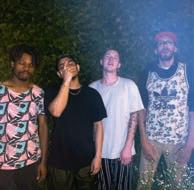
35 Shows of note Chicago Mariachi Festival, Psalm One, Flipper with David Yow, and more this week
40 Early Warnings Blanck Mass, Elvis Costello & the Imposters, Vic Mensa, and more just-announced concerts
40 Gossip Wolf Radio Free Honduras celebrate their first album in five years, outstanding rapper Xavier Holliday releases his swan song, and more.
41 Savage Love Dan Savage offers advice to a shy gay man who seeks the secret password to sexual adventure.
42 Jobs
42 Apartments & Spaces
42 Marketplace

PUBLISHER TRACY BAIM
EDITORS IN CHIEF SUJAY KUMAR, KAREN HAWKINS
DEPUTY EDITOR KATE SCHMIDT
CREATIVE LEAD SUE KWONG
DIRECTOR OF PHOTOGRAPHY JAMIE RAMSAY
CULTURE EDITOR AIMEE LEVITT
MUSIC EDITOR PHILIP MONTORO
ASSOCIATE EDITOR JAMIE LUDWIG
SENIOR WRITERS DEANNA ISAACS, BEN JORAVSKY, MIKE SULA
STAFF WRITERS MAYA DUKMASOVA, LEOR GALIL
EDITORIAL ASSOCIATE S. NICOLE LANE
GRAPHIC DESIGNER DAVON CLARK
SOCIAL MEDIA EDITOR BRIANNA WELLEN
MUSIC LISTINGS COORDINATOR
SALEM COLLO-JULIN
FILM LISTINGS COORDINATOR PATRICK FRIEL
THEATER ASSIGNMENTS EDITOR CATEY SULLIVAN
CONTRIBUTORS NOAH BERLATSKY, DAVE CANTOR, LUCA CIMARUSTI, ISA GIALLORENZO, ANDREA GRONVALL, KT HAWBAKER, RACHEL HAWLEY, JUSTIN HAYFORD, JACK HELBIG, IRENE HSIAO, DAN JAKES, MONICA KENDRICK, STEVE KRAKOW, MAX MALLER, BILL MEYER, QUINN MYERS, J.R. NELSON, LEAH PICKETT, KERRY REID, BEN SACHS, DMITRY SAMAROV, TIFFANY WALDEN, ALBERT WILLIAMS
DIRECTOR OF DIGITAL JOHN DUNLEVY
DIRECTOR OF PUBLIC ENGAGEMENT & PROGRAMS KRISTEN KAZA
OFFICE MANAGER SORAYA ALEM ADMINISTRATIVE ASSISTANTS JANAYA GREENE, YAZMIN DOMINGUEZ
ADVERTISING
312-392-2970, DISPLAY-ADS@CHICAGOREADER.COM
CLASSIFIEDS: SALEM@CHICAGOREADERCORP.COM
SALES DIRECTOR PATTI FLYNN
VICE PRESIDENT OF SALES AMY MATHENY
CLIENT RELATIONSHIP MANAGER TED PIEKARZ SENIOR ACCOUNT REPRESENTATIVES BOB GRIFFITH, ANDREW HAYES, JORI LIEFSCHULTZ, LENI MANAA-HOPPENWORTH, ALEX RAY, LISA SOLOMON, BILL WOSSOW CLASSIFIED SALES MANAGER WILL ROGERS
NATIONAL ADVERTISING
VOICE MEDIA GROUP 1-888-278-9866 VMGADVERTISING.COM JOE LARKIN AND SUE BELAIR
DISTRIBUTION CONCERNS distributionissues@chicagoreader.com 312-392-2970
STM READER, LLC
BOARD PRESIDENT DOROTHY R. LEAVELL
TREASURER EILEEN RHODES
SECRETARY JESSICA STITES
AT-LARGE SLADJANA VUCKOVIC
CONSULTANT CAROL E. BELL
READER (ISSN 1096-6919) IS PUBLISHED WEEKLY BY STM READER, LLC 2930 S. MICHIGAN, SUITE 102 CHICAGO,

“These
– Steve Johnson, Chicago Tribune
CHICAGO SUMMERDANCE
chicago.gov/city/en/depts/dca/supp_info/ chicago_summerdance.html
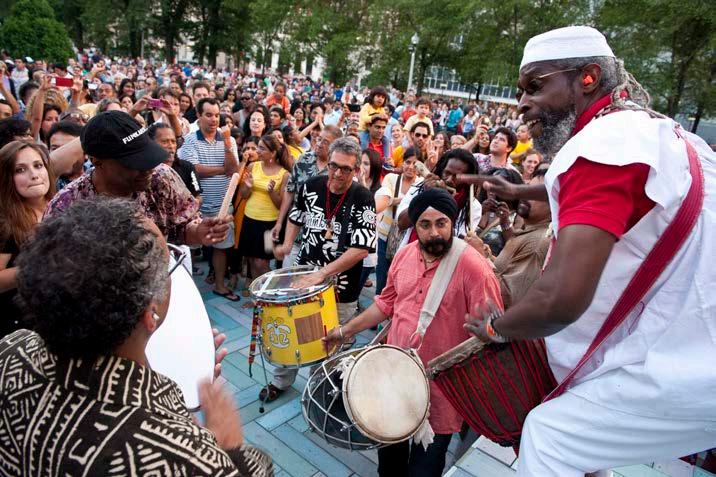
Public Service Announcement
Get down with some grace
By SALEM COLLO-JULIN
IT’S TIME AGAIN for one of the city’s best free gifts to us: SummerDance! For just over eight weeks this summer, you’ll be able to find free events each week at a variety of public locations celebrating dance styles from all around the world. Sir Nose d’Voido unk, Bob, Sheila, Chad, and everybody can get down with some semblance of grace thanks to the free dance lessons that each event starts with, courtesy of local professional dancers and dance studios. If you still feel like this is not for you because you have core-deep shame about sticking your butt out in public (by the way, we’ve seen it, it’s fine, we have one too, don’t worry about it), you can also just sit on the sidelines and enjoy the bands.
Visitors to events scheduled at the Spirit of Music Garden will also get to see (and stomp, tap, and work it out on) local art: for years, the city has commissioned Chicago-based artist Dan Peterman to provide the dance floor, a now-4,900-square-foot work of art completely made of recycled material. I’ve listed some personal highlights below, but check out the city’s website for the full schedule.
Fri 6/28, 6-9 PM : Chicago & Detroit House set with Excursions: DJs Cordell Johnson & James “JV” Vincent at the Spirit of Music Garden in Grant Park (601 S. Michigan)
Thu 7/11, 5:30-8:30 PM: Lynne Jordan & the Shivers and Dawud & Lura Shareef bring the sounds of soul, R&B, and Motown to Buckingham Fountain (301 S. Columbus)
Wed 7/31, 6-9 PM : Shimmy to salsa with the help of Denita Inez & Desueño Dance, along with DJ El Caobo Internacional at Douglas Park (1401 S. Sacramento)
Wed 8/7, 6-9 PM : Learn kizomba and Brazilian zouk with Kizomba Chicago and Urbanity Dance Chicago at Willye B. White Park (1610 W. Howard)
Sat 8/24, 1-8 PM: A day of dancing and music to celebrate the finale of this season’s SummerDance at locations throughout Millennium Park (201 E. Randolph) v
Stonewall 50
Your guide to some of the biggest LGBTQ events this weekend
By S. NICOLE LANE
FROM BRONZEVILLE TO Boystown and beyond, here are some of the events closing out this anniversary Pride Month.
HIGHFEMME: Pride Edition is a celebration of queer and trans femmes of color hosted by Lucy Stoole, Jessica Laskaris, and Barry Brandon and featuring performance art by Melissa Coffee, Michael Robinson, Iv Fischer, and Alex & Effee. DJs Tess and Cqqchifruit will spin alongside photo booths and video installations. Thu 6/27, 9 PM-2 AM, Cerise Roo op, 203 N. Wabash, free before 10 PM, $10 a er
Spanning three days and five communities, the Pride South Side Festival kicks off at the Stony Island Arts Bank and closes at Connect Gallery, with events in between at the Promontory, DuSable Museum, and the Breathing Room. Fri 6/28-Sun 6/30; most of the festival is free but some events require tickets, 21+
Chicago Is a Drag Festival , the city’s first-ever festival of its kind, premieres in Andersonville. Fi y artists, including headliners Raja, Candis Cayne, and Spikey Van Dykey, will perform along with up-andcoming local acts. Fri 6/28, 4 PM, behind Cheetah Gym, 5238 N. Clark, $25, 21+

The Chicago Dyke March collective celebrates dyke, queer, bisexual, and transgender people with a march, followed by a rally with performances, music, and discussion. Sat 6/29, march 1:30 PM, Little Village Academy, 2620 S. Lawndale; rally 3:30 PM, Piotrowski Park, 4247 W. 31st.
The queer south-side party collective TRQPiTECA is hosting its first queer pride in Ping Tom Memorial Park, 1700 S. Wentworth, in Chinatown. Expect DJ sets from La Spacer, Cqqchifruit, Jared Brown, Sasha NoDisco, and Hole Boss (plus many more) as well as performances by Alex & Effee, Darling Shear, and K I A M. Sun 6/30, 3-10 PM, free, all ages, wheelchair accessible.
And of course, the biggest party of them all, the Chicago Pride Parade, will close out the month. The theme of this year’s parade is “Stonewall 50: Millions of Moments of Pride.” The parade begins in Uptown and winds its way through Boystown before ending in Lincoln Park. Sun 6/30, noon to 4 PM, step-off is at Broadway and Montrose. v



LANGUAGE LESSONS
From allosexual to zaza and zir, terms you won’t find in your Funk & Wagnalls
By S. NICOLE LANE
ALLOSEXUAL Used within the asexual community to mean someone who is not asexual
AMAB OR AFAB “Assigned male at birth” and “assigned female at birth.” Some people prefer DMAB / DFAB , i.e., “designated (male/female) at birth,” or CMAB / CFAB , where the C stands for “coercively.”
AROMANTIC Feeling little or no romantic attraction to anyone
ASEXUAL Someone who has low sexual desire for sex or for a partner
BEAR A person within male gay culture who projects an image of rugged masculinity
BINDER Cloth strips, elastic, or spandex undergarments used to flatten the breasts
BIPHOBIA Negative attitudes toward bisexual people
BOI Can refer to a variety of identities: a butch lesbian, a submissive in the BDSM community, a young trans man
BOTTOM The receptive partner, o en seen as the submissive partner
BOTTOM SURGERY Typically refers to three types of surgeries: vaginoplasty, phalloplasty, or metoidioplasty
CISHET Someone who identifies with their assigned gender at birth and is also heterosexual
CONSTELLATION The interweaving and structure of a polyamorous relationship
CUB A younger version of a bear
D&D Drug and disease free














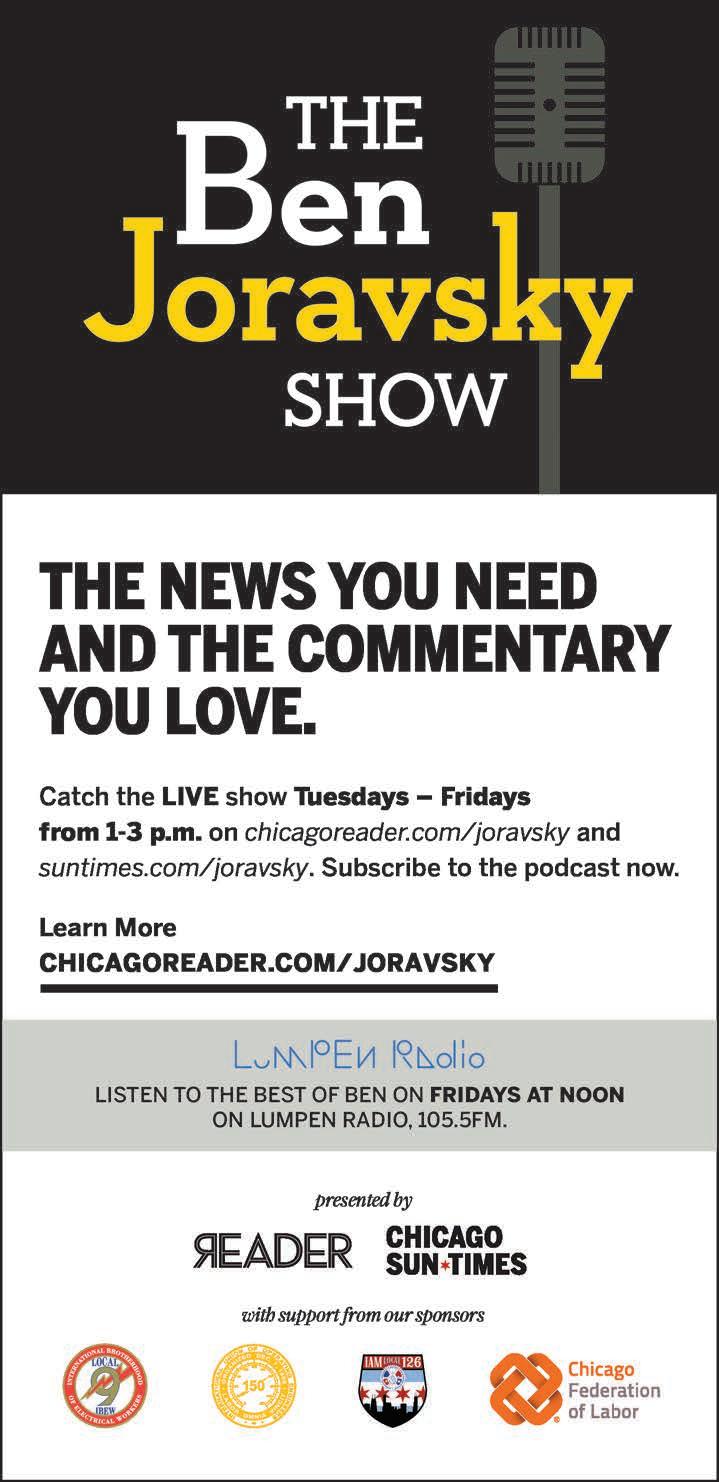
DATEMATE A gender-neutral term for a person you are dating
ENBY A nonbinary person
FOLX Alternate spelling of folks used to address a group of people in a nonbinary way
FRONT HOLE, BACK HOLE Alternate language for vagina/anus
FUTCH Used to describe a queer person who presents as both femme/feminine and butch
GAFF A device that hides the bulge of a penis
GENDER DYSPHORIA Distress that occurs when a person’s assigned birth gender is not the same as the gender with which they identify
GENDER NONCONFORMING (GNC) Not being defined by society’s conventional definitions of gender
GENDER TRANSITION The process by which people strive to more closely align their internal knowledge of their gender with their outward appearance
GENDERFUCK Bending or fucking with gender roles
GRANDY Gender-neutral term for grandma or grandpa
INTERSEX Individuals who are born with several variations of sex chromosomes, sex hormones, or genitals
MADDY A term for trans women who have children
MUFFING Penetration of the inguinal canal; also a way to tuck, for trans women
MX. Gender-neutral abbreviation for Mr., Ms., etc
NIBLING Gender-neutral term for niece/nephew
NONBINARY Not exclusively masculine or feminine—outside the gender binary
OTTER A gay man whose body type is thin or of athletic build
PANGENDER Identifying as more than one gender
PANSEXUAL Someone who is attracted to all genders
PGPS Preferred gender pronouns
SOFFA Significant others, friends, family, and allies of trans people
SPROG Gender-neutral term for son or daughter
STEM A lesbian who falls somewhere between butch and femme
TERF An acronym for trans-exclusionary radical feminists, i.e., those who are transphobic and do not consider trans women as women
TOP The dominant, or pleasure giver
TOP SURGERY Typically, breast augmentation or the construction of a masculine chest
TUCKING The act or process of hiding the testicles or penis (see gaff)
TWINK A young, small gay man
TWO-SPIRIT A term to describe a traditional third-gender ceremonial role among Indigenous North American people
WOLF Like bears, but more aggressive and masculine
ZAZA Gender-neutral term for mom or dad
ZE/HIR, PRONOUNCED /ZEE/ AND /HERE/ Gender-neutral terms to replace he and she and his and hers

And it’s free!
By DEANNA ISAACS
As this cold, wet June wore on and no schedule had been posted for Theater on the Lake’s annual storefront-theater festival, which was supposed to commence June 23, concern grew among longtime fans that it might not be happening.
Then, midmonth, phew! A schedule popped up on Facebook and the TOTL website, albeit for a short season: six productions in five weeks, starting July 16 and running (with two weeks o ) through August 30, Tuesdays through Fridays, for a total of 20 days, supplemented by three staged readings.
Thanks to a contract that enabled a privately funded $6.5 million makeover of the 1920s-era Prairie-style facility (after federal and city money paid for a $31.5 million project to stabilize the bordering Lake Michigan shoreline), we won’t be seeing theater there on weekends. Saturdays are reserved for private events, mostly weddings and concerts, booked through Lakefront Hospitality Group, which sells the liquor for those events; it also operates the main business in the building, the Lakefront Restaurant, presided over by
cost was done to make the plays more accessible. It also brings the festival in line with most everything else operating under the umbrella of the Park District’s Night Out in the Parks program. This year, Grandone says, Night Out in the Parks will partner with at least 43 theater companies to present more than 200 free performances in more than 125 city parks. She also says the delay in posting the schedule was due to two companies that backed out and had to be replaced. (Remounting a play months after it closed is a “big ask” for these small companies, Grandone says; it doesn’t always work out.)
So, here’s what this year’s coartistic directors Tony Santiago of Arts Alliance Illinois and Quenna Lené Barrett of the Goodman Theatre have lined up: Manual Cinema’s The End of TV (July 16-19); a double bill of 2nd Story’s Stories From 2nd Story and Alex Grelle’s The Grelley Duvall Show (July 23-26); the Neo-Futurists’ Tangles and Plaques (August 13-16); Pegasus Theatre’s Eclipsed (August 20-23); and Steep Theatre Company’s Red Rex (August 27-30).
Picnic meals from the Goddess and Grocer can be preordered with a reservation; TOTL will lend patrons a blanket on which to enjoy them.
The staged readings of plays by Keyanna Khatiblou, Tina Fakhrid-Deen, and Nancy García Loza, finalists in TOTL’s In the Works new-play commission project, will be held at other Park District locations.
trict.com ). It’ll launch with an interactive discussion of whether Chicago should become the first city in the nation to adopt a Cultural Bill of Rights. That’ll be led by Arts Alliance Illinois, which will be submitting the idea to Mayor Lori Lightfoot later this summer. Lest we get too excited about that, note that AAI executive director Claire Rice says this bill of rights would be a guide for policy and programming, not a legally binding amendment to anything.
Also on tap: presentations and workshops by the Chicago Inclusion Project, Not in Our House, the Chicago Cultural Accessibility Consortium, and 2nd Story; bus trips to theater facilities at three other parks; a “CircEsteem” showcase; a barn dance; and a pitch session intended to introduce Chicago shows that want to tour to programmers who might book them. (The workshops have attendance limits and require preregistration.) It’ll all conclude with a TOTL reunion party Friday night, celebrating 67 years of Chicago theater in the newly slick old space.
Grandone says her major takeaway from TOTL’s inaugural season in the renovated digs last year was “how isolating the design of the festival is” for the performers. “Companies come in, one by one, they do their show, and leave. But the joy of festivals is seeing other people’s work and spending time with them.”
chef and rapper Cleetus Friedman (last seen in this column after Lake Forest High School o cials took o ense at his routine and booted him midperformance). Sundays are for changeover.
There’s some good news, however: the tickets for those 20 days of plays will be free.
TOTL managing director Angelique Grandone says that the switch from low-cost to no
And there’s a major “Prologue” to the season that’s happening this week: a free three-day event (June 26-28) to “celebrate and shape the future of performance.” Its target audience is the theater community, but it’s open to the public, and Grandone says anyone with an interest in Chicago theater is welcome.
Prologue runs from morning into evening all three days (schedule at chicagoparkdis-

Whatever else it accomplishes, she says, Prologue will address that: “It’s a chance for everyone to get together.” v
RESTAURANT REVIEW
At Politan Row, chef Chris Reed cooks from his parents’ different traditions.
By MIKE SULA
Indonesian and creole food have practically nothing in common—except for Chris Reed.
He’s the chef behind Bumbu Roux in the West Loop’s Politan Row, a vendor who represents another unlikely crosscultural marriage of cuisines born of an actual human marriage. Like Margaret Pak of Thattu, across the hall, who hints at the great potential of a Keralite-Korean (Koralite?) mash-up with her kimchi upma, Reed demonstrates Indo-creole compatibility with a pork sambal po’boy: vivid, cool, crunchy pickles, neon-lit with turmeric, brightening the meaty richness of shoulder debris braised in sambal, garlic, and ginger. All mayo-slathered and baguette-swaddled, it’s a sandwich that spans oceans and commands all the senses.
For the past ten years Reed, along with his mother, Priscilla, has operated the catering and pop-up operation the Rice Table, and during much of that time it was the city’s only commercial representation of the food of the Indonesian archipelago.
Indonesian food itself is an archipelago of regional cuisines, flavored by centuries of Indian, Chinese, Spanish, Portuguese, Arabic, and Dutch influence. The Reeds became known for the eponymous multidish feast known as rijsttafel (rice table), but also worked the summer festival circuit, introducing sweaty Pitchfork crowds to peanut-sauced satays, coconutcurried tempeh, and stewy beef rendang.
But Priscilla Reed—who was born in Bandung, West Java, and grew up in the Netherlands—knows how to cook more than just Indonesian fare. Her late husband, Donald, came from Napoleonville, Louisiana, and early in their marriage when they lived in Germany, he taught her to make the food he was homesick for: gumbo, red beans and rice, blackened catfish, and “the turnips,” as they were known—which Chris Reed later realized was essentially an etou ee, the classic roux-
thickened, creole-Cajun rice “smother,” subbing root vegetables for chicken or shrimp.
About four years ago, shortly after his father passed away, Reed started offering dishes such as these to his catering clients, not just to drum up business but “as a way to feel like I still had my dad around.” Creole-Cajun pop-up gumbo parties with beer and live jazz followed, a pivot that caught the attention of the Politan Group, whose first multivendor food hall was the Saint Roch Market in New Orleans’s Bywater District.
Reed always kept the cuisines more or less separate, and still does. Apart from the sambal po’boy—which evolved from a banh mi he once served called the Krakatoa—he keeps the food mostly faithful to its origins. “I definitely want to represent both cuisines on their own,” he says. “When it makes sense to have them come together I will, but I never want the feeling that I’m just trying to mash them together. To me the most important thing is showing what they are at their purest.”
That doesn’t mean they can’t startle you out of the fog of expectations. Reed’s seafood gumbo is a fairly classic stew of blue crabmeat, shrimp, and oysters, but its silky richness enslaves the parietal lobe the minute it coats the mouth and administers its slow, gentle burn.
Short-lived Indonesian restaurants like August Moon, Angin Mamiri, and De Quay have come and gone—part of the reason the Reeds hesitated for years to open their own brickand-mortar spot. Lincoln Park’s delightful sixyear-old Rickshaw Republic notwithstanding, they weren’t sure Chicago was ready for one. And Indonesian food still isn’t as easy a sell as creole. Reed thinks he serves more blackened catfish with sides of red beans and rice and turnip etou ee than anything else, some customers waiting up to seven minutes for the fillets to get seared back in the vendors’ shared kitchen. While the beef in the more traditional debris po’boy gets braised in Cafe du Monde

co ee, the chicory lending a layer of nuttiness to the roasted-garlic aioli and house-made pickles, the aforementioned sambal po’boy may serve as a gateway to the Indonesian stu for a West Loop crowd that sometimes needs encouragement. Priscilla is usually at the counter to explain that gado-gado is a composed salad—here subbing green-leaf lettuce and tofu for cabbage and tempeh—and that the taste of the soy-marinated chicken bakar is
on the sweeter rather than the spicier side of the spectrum.
Reed says the house-made tempeh-andshrimp chips known as kerupuk provide another unthreatening introduction. They come with the chicken bakar as well as with the rendang, here a saucy version of the slow-cooked, coconut-infused beef dish, its spicy gravy absorbed by a pile of white rice alongside garlic-soy-braised bok choy.
Search the Reader’s online database of thousands of Chicago-area restaurants—and add your own review—at chicagoreader.com/food.

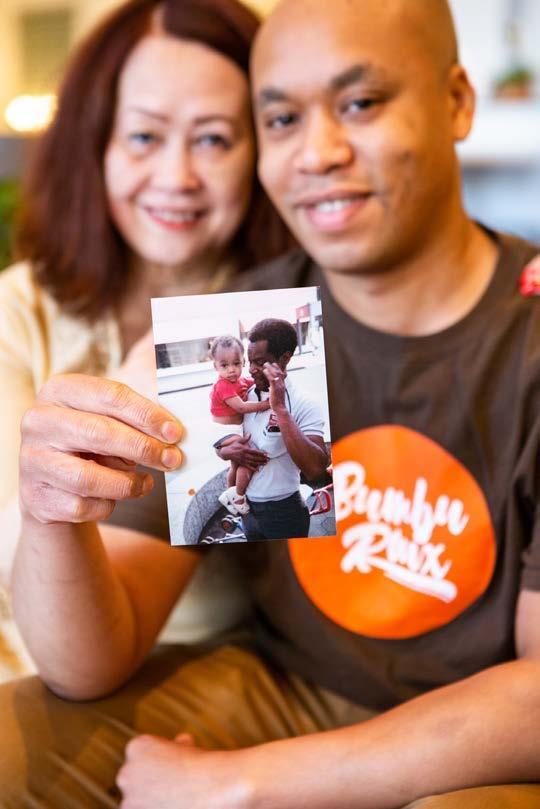
Opposite page: (clockwise from le ) roast beef po’boy; sambal pork po’boy; beef rendang with rice, kerapuk (tempehand-shrimp chips), and braised bok choy; acar kuning (yellow pickle); turnip etouffee; gumbo
Le : Chris Reed and his mother, Priscilla. Chris holds an image of his late father, Donald, holding him as a child.

Reed says the setup at Politan Row is conducive to change, and like Margaret Pak, he’s planning on introducing new creole and Indonesian dishes, and even some mash-ups, such as his take on sambal goreng udang , spicy stir-fried shrimp, served not with rice but over grits. You know, when it makes sense.
The name Reed came up with is shorthand for the way he and his mother make sense of what they’re doing for puzzled first-timers. Turns out Indonesian and creole food do have something in common. Bumbu is the Indonesian word for a spice blend, which, much like a creole roux, is the foundation of Indonesian cuisine.
“They’ll say ‘Indonesian-creole? How’d you come up with that?’” says Reed. “I didn’t come up with it. This is my mom. That was my dad.” v
@MikeSula




BRUNCH OF BITCHES
Sun 11 AM and 2 PM; also Sat 6/29 11 AM and 2 PM, the River, 2909 N. Sheffield, 773 -935 -7500, theriverchicago.com , $ 40
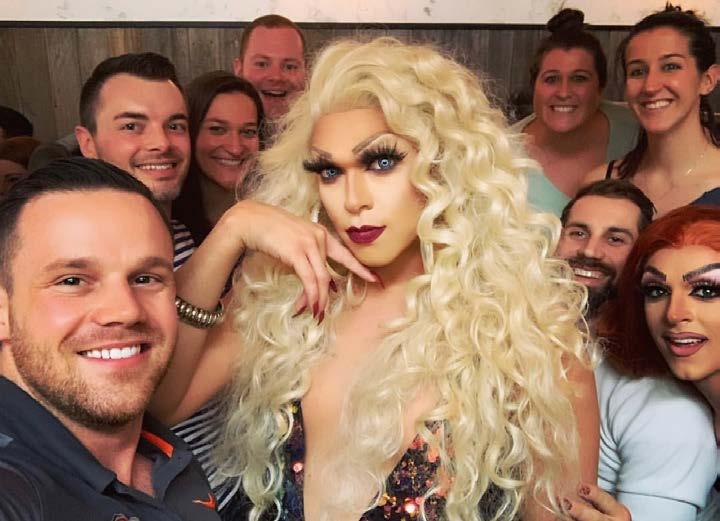
The Pride party continues at the River’s Brunch of Bitches.
By OLIVER SAVA
Yesterday two kids, brothers who both look younger than ten, were at Pokémon Go Fest. Today they’re at the River watching drag queen Elektra Del Rio literally swing from the rafters, totally overwhelmed by the loud music and the experience of being the only children in a screaming crowd of 150 adults. They are the toughest audience I’ve seen at any of my four drag brunches.
Drag has fully permeated the mainstream, and the Lakeview bar and grill formerly known as Mad River, a notorious watering hole for messy DePaul students and Cubs fans, has gained a reputation as the home of the hottest drag brunch in Chicago. Brunch of Bitches debuted on February 10 and immediately blew up thanks to the explosive show put on by cohosts Veronica Pop, Kim Passable, and Del Rio.
“The numbers on week four were the numbers they thought they would get for month four,” says Passable, 27.
There are the expected groups of gay men
and bachelorette parties, but straight couples and families with kids are also joining the fun. RuPaul’s Drag Race turned drag into prime-time cable entertainment enjoyed by viewers across all ages, races, genders, and sexual orientations, and got them interested in watching live drag. (The River recognizes the TV show’s impact, and starts every brunch with the song “Hieeee” by Drag Race champion Alaska Thunderfuck.)
Brunch of Bitches satisfies that craving with exhilarating performances and a celebratory atmosphere. The three hosts and a guest dance and lip-synch their hearts out over two hours, jumping on tables, doing death drops on the bar, and somersaulting down the aisles. The girls catch their breath with filthy banter between sets, and are always looking for ways to interact with the audience, usually to give away free stu . At my first brunch, I won two free passes to another brunch in a fake orgasm contest because that’s just how drunk they get you.
Brunch of Bitches originated at the River’s sister bar, Mad River NYC, where the events and marketing manager, Rodrigo Cespedes, saw an opportunity to fill a void on the Lower East Side. He drew inspiration from the drag brunches he saw while working on Fire Island and put together a brunch that has also seen considerable success. The idea was passed along to the River’s general manager, Jon Poremba, who scoped out local drag shows while employees put out feelers on social media for potential queens.
Pop, Passable, and Del Rio had worked together on multiple occasions, and when the River started looking for queens, the three pitched themselves as a group. Their chemistry is essential to Brunch of Bitches’ popularity. “What you’re paying for is the show, the experience,” says Del Rio. “The food and alcohol are a bonus. You’re paying for the entertainers.”
That bonus food and alcohol present diculties, especially when the attendance greatly outnumbers initial estimates. Poremba recalls understa ng the servers and kitchen at the first shows, and the fundamental question
created by the demands of drag brunch: “How are we going to get all these people in here, sat at the same time, have everyone get food as fast as possible, get their drinks, and then get up at the end because we’ve got another one coming?” The operation isn’t perfect, but it’s impressively smooth considering the scale.
After the first week, the River found a Boystown partner in Splash Chicago, a bar and nightclub just under a year old. Brunch of Bitches directs patrons to Splash after brunch for discounted drinks. Splash’s Tens drag competition on Monday nights promotes the River’s events—including a Wednesday drag bingo—and provides guest talent for Brunch of Bitches, which has become a place for young queens to get large crowd experience and earn major cash if they turn it out. (The two establishments will share a float in this year’s Pride Parade.)
Nearly 40 queens have come through the River, but performing for so many people in such a large space poses a challenge for queens who are used to smaller clubs where sight lines aren’t an issue. “Our biggest struggle was getting so big so fast,” says Del Rio, 28. “We didn’t know how to give the best we could to every single person.” That meant doubling the length of track mixes from the standard three to four minutes so that performers could make it through the entire bar before their music ends. DJ Spenser “Scheiny” Scheinman keeps
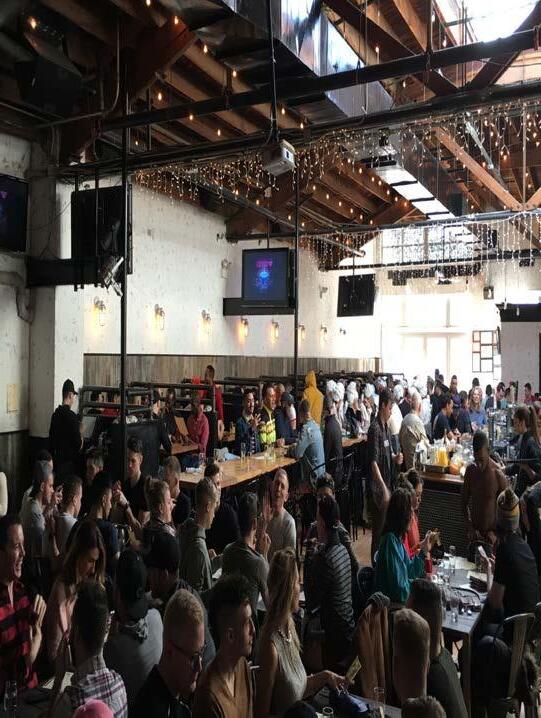
the music going on and on for the big finale, giving the queens ample time to score their last wads of cash from the wasted masses.
“I do a zoom-in and zoom-out mode,” says Passable. “Here’s a table, I’m interacting with you, giving you a smile, blowing you a kiss. Then zoom out and do a dance that the whole crowd can see. If there’s no floor space, get on the bar, get on the table.” For Del Rio, the rafters and window frames are also fair game, and she’s been known to carry a barstool into the middle of She eld Avenue, stand up on it, and jump into the splits on the pavement.
Some might see the River’s drag events as a straight establishment cashing in on popular queer culture, but it’s a project spearheaded by queer employees, financing queer artists, and increasing queer visibility in a straight pocket of Lakeview. Drag queens now regularly drop by the River, where they are showered with attention, and straight employees come out to support the queens at other venues in the city. “I always heard [the River] was such a bro place, but now I’ll go on a Thursday in drag and everyone is obsessed,” says Pop, 26.
That extends to the two young Pokémon fans I met earlier. Del Rio won’t stop until she wins them over. She gets them screaming and laughing because she keeps fumbling one of their names. She brings them a scoop of ice cream. She doesn’t censor any of her very adult content, but she finds ways to playfully engage with them so they don’t feel left out. And it works. By the end of the show, one of the boys is smiling for selfies with his gay uncle while a drag queen high kicks on a table and another struts past flicking a fan with Iconic printed across it.
The sense of communion that emanates from the River at the end of brunch is downright inspiring, with hundreds of people united in their appreciation of this proudly queer art. “If you’re going through something in life, please leave it at the door and have fun with us,” says Pop. “There’s so much shit going on in the world, we want to create a safe space where people can let go and be themselves and not get judged.” v



The beauty of the sometimes less-visible modern family
Written and photographed by
RYAN EDMUND
WHEN QUEER PEOPLE choose to start a family, major life decisions like where to live and attend school require extra consideration. Mercedes Santos and Theresa Volpe, one of the first legally wed gay couples in Illinois, are raising their three children in Evanston and enrolled them at Baker Demonstration School in Wilmette because of its progressive and inclusive community. “We had to consider how our children would be accepted in their school, as well as the neighborhood they grew up in, based on our family structure,” Volpe said. “Our children have thrived in their school because they had teachers who saw them for exactly who they are, embraced them, and created an environment where all di erences are celebrated.”
Acceptance and inclusivity within the family often requires a great deal of persistence and strength. Jamila Raegan gave birth to her son, Bashir Oliver, when she was 22. When her marriage ended two years later, Raegan had to navigate raising Oliver, who has autism, and cope with a family that didn’t fully embrace her queer identity. Now she and Oliver, who is 17, have a healthy nontraditional family structure.
As a queer-identifying photographer, I’m often thinking about the representation and visibility of my community. After visiting the five families in these photographs, I’ve grown to have a deeper understanding of the complexities and planning that goes into the process of having kids for queer people. It takes time, money, sacrifice, and sometimes resistance. v
@talldarkandryan








from le : husbands Tyler Greene (right) and Ziwu Zhou (le ) holding their ten-week-old son, Sam Anda Zhou-Greene. Sam was born via surrogacy, with Greene’s sister as the egg donor.
Greene and Zhou in their home
Playing with their son in his crib


Moor and Raegan holding hands
A photo of Oliver sleeping. Raegan visits him and his father at least once a month from Chicago while she attends school.




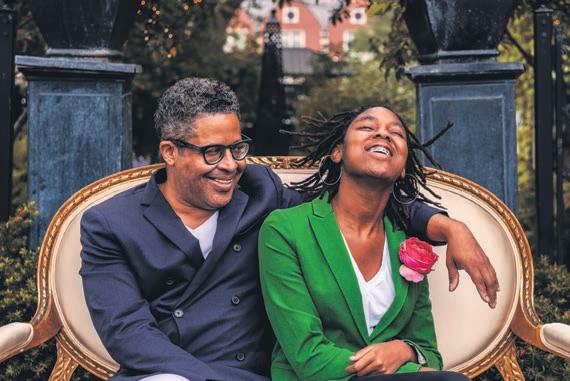



The journey to LGBTQ equality in Chicago—to the point where we have an openly lesbian mayor—was made possible by the courage of several generations of activists.
Starting with postal worker Henry Gerber and the short-lived Society for Human Rights he helped launch in 1924, there have been tens of thousands of activists who have made progress possible.
But in the last century, prior to the Stonewall riots in 1969 sparking a new surge in the push for LGBTQ equality, there were just a few dozen brave individuals who allowed their faces and real names to be associated with Chicago’s fight for “homosexual” rights.
Most of those people have died, including Gerber. Pioneers from earlier eras included jazz musicians Tiny Davis, Ruby Lucas, and Tony Jackson; bar owners Chuck Renslow, Jim Flint, and Marge Summit; attorneys Pearl Hart, Renee Hanover, Ralla Klepak, William B. Kelley, and Ed Mogul; and activists Vernita Gray, Marie Kuda, Jackie Anderson, George Buse, and Henry Weimhoff.
In this week’s editions of the Chicago Reader and Windy City Times, we are looking back at a

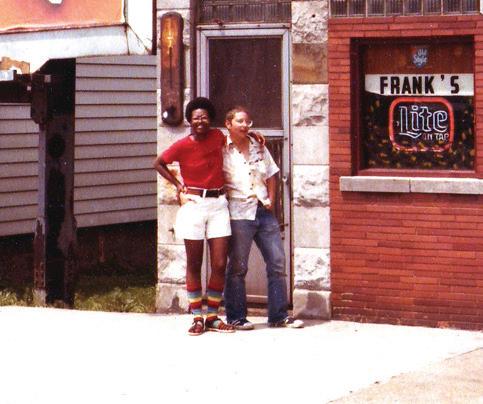
few of the “Stonewall Generation” who are still alive and able to tell their stories. The people below are just a small slice of the community, from activists to cultural pioneers, but they represent the names and voices of thousands of others.

The movement grew after those riots at the Stonewall gay bar in New York City 50 years ago this month. But it did not grow from nothing—many of the people below helped plant the seeds, while others provided the nourishment to help them grow.
If you want to know more about Chicago’s LGBTQ history, you can read my book Out and Proud in Chicago, watch the companion film WTTW produced, or check out the website ChicagoGayHistory. org for oral histories. Owen Keehnen and I wrote biographies of Renslow, Flint, and Gray, and I have a collection of Kuda’s essays, Kuda: Gay and Proud, now available. More information on many of these pioneers is also available at the LGBTQ Hall of Fame website. Other resources include the Gerber/Hart Library, the Leather Archives & Museum, and books by Sukie de la Croix and Owen Keehnen.
—Tracy Baim, publisher of the Chicago Reader and owner of the Windy City Times
Gloria “Mama Gloria” Allen
Gloria Allen, now in her mid-70s, has been an out-and-proud transgender woman fighting for rights and dignity for decades. But it has only been in recent years that her life has been amplified through a play and, soon, a documentary.
“You can’t fit me into a pigeonhole,” she told Windy City Times in 2015. “I’m just a person who’s out there, in love with life. I really do everything that I can when I can, and if I’m needed to be there, I’m there.
“So many trans women of color don’t make it to my age. There’s a few out there, and you can count them on your fingers. I am blessed and proud to be here to talk, because older trans women should be heard. We walked that long mile to get here.”
“The [1963] March on Washington had a big impact on me,” Allen said. “I remember Martin Luther King coming to Cicero. But if I went over to Cicero, I would have either been lynched or murdered. The north side wasn’t any better. Blacks coming up north were all carded and profiled [by the Chicago Police Department]. We had to have at least three pieces of ID with the same name on it. Halsted had so many clubs and a lot of gay men, but transgender girls just did not exist.”
Allen spent her weekend evenings performing at clubs on the south side. “There was the Bonanza Club and the Burning Spear,” she said. “The girls would put on shows there. My mother gave me her old dresses. But they were good clothes, designer clothes.”
She moved to New York’s Greenwich Village in 1969 looking to perform on Broadway, a dream that would be forever deferred. She did experience the NYPD of 1969. “The police were vicious,” she said. “They’d arrest you if you rolled your eyes at them. The violence against transgender women was horrific. They were being stabbed and found in garbage cans with their bodies chopped up. The police were killing us too. They would raid the clubs and drag us out. It was like living in Salem during the witch hunts. If you were Black and transgender, it was bad.”
She recalled June 1969 at the gay Stonewall Inn: “We just got tired of it. The girls decided, ‘We’re going to fight,’ and we fought because we weren’t going to take it anymore.”
“Trans people weren’t in existence at all,” she said. “A lot of people would come to the clubs just to see the trans girls perform, and we would put on a good show. They put us into categories—sex workers or entertainers. They didn’t realize we were educated. The lesbians hated us and we couldn’t understand why. It’s changed now, but when I was coming up, lesbians would fight us just because we were trans girls. The gay men didn’t like us because we were feminine.”
She returned to Chicago in 1974 and started working the clubs, but citizens and police alike targeted transgender people. “A lot of trans girls were being murdered,” she said.
The next enemy that knocked on the door was AIDS. “When AIDS came out, everyone I knew were dropping like flies,” she said. “We didn’t know what was going on.”
“I’m not ready to stop,” Allen told WCT. “I’m ready to give people what was given to me. These kids are my babies, and if my mother, aunt, and grandmother were here now, they’d be helping out.”
Michal Brody, PhD, born in 1948, is an activist and author inducted into Chicago’s LGBT Hall of Fame for her work as a founding member of the groundbreaking Chicago Gay Liberation group in 1969, a founding member of Chicago Lesbian Liberation in 1970, and her 1985 book Are We There Yet?, a history of lesbians in Chicago.
“I got involved in the first organized gay liberation in Chicago in November 1969, when it started,” she wrote in an e-mail. “Although the group was organized by University of Chicago students (Henry Wiemhoff, principally) and used the Chicago Maroon for publicizing meetings, the people who came to those early meetings were mostly non-[U. of C.] people and pretty much reflected general southside demographics; that is, a broad class spectrum, and many Black folks. I think that’s really significant and generally overlooked. A lot of conversation went to how to not get harassed or busted by the Chicago cops—the women, for not wearing enough ‘women’s’ garments, and the boys, for being too swish. Activism really began there; I don’t think the concept of rights was even on the horizon.”


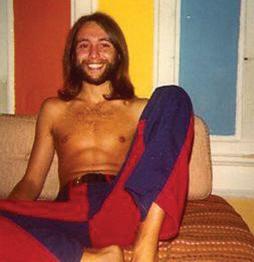
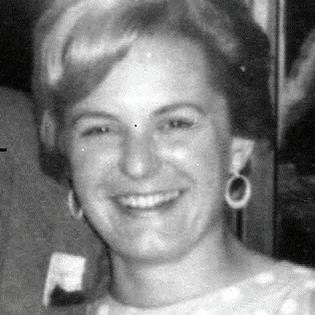

Armand Cerbone has been an advocate and activist on LGBTQ mental and physical health issues for several decades, including as a leader in the American Psychological Association.
Cerbone, in solo practice since 1978, is among the first psychologists to offer affirmative psychotherapy to the LGBTQ community. In the mid-1980s he organized the Midwest Association of Lesbian and Gay Psychologists to provide support to lesbian and gay psychologists in the field and to foster affirmative psychotherapy.
Cerbone has been a longtime Illinois Psychological Association member and was its first out gay president from 2004 to 2005. He held leadership positions at the APA, including chair of the board of directors.
Born in 1946, Gary Chichester came out in 1964.
“I am fortunate to have come out early in my life with the support of my friends and eventually my family.” he said. “The 1968 Democratic National Convention radically changed my life, so by the time Stonewall took place, I was set to fight for my rights as a human being. Becoming involved with the Gay Liberation Movement and, later, Chicago Gay Alliance, I had the opportunity to meet and work with some of the most dedicated people in the movement.
“I believe the early years of the movement built a strong foundation to build on. I never thought I would live to see marriage equality, an open lesbian mayor of my city, and an open gay man running for the highest office in the country. We must remember that there is still much to do.”
Longtime LGBTQ historian and professor John D’Emilio said his first organized effort to move “gay liberation” forward came in 1973, “when a group of gay men and lesbians in New York City came together to figure out how research could be a tool for liberation. Soon we had formed the Gay Academic Union. By 1975, almost a thousand people attended our annual conference. And I was launched on a lifetime path of researching and writing about LGBTQ history.”
Veronica “Ronnie” Drantz, born in 1943, started her activism in 1970 at the Astro Restaurant in the heart of Chicago’s gay neighborhood at Clark and Diversey (aka Diversity).
“While waitressing there in the summer of 1970 the boss commanded me to overcharge two customers and told them to never come back because they were gay,” she said. “I reported this to Chicago Gay Liberation. The result was 35 CGL members picketing and leafleting the Astro for nine consecutive days, starting August 7, 1970—the first Chicago gay protest of its kind. My favorite sign was ‘Up Your Astro.’”
Murray Edelman, born in 1943, came out in 1965. By 1970, “we came out to friends, family, and colleagues, not knowing the consequences, for we hoped to be future role models for others. We stood up to the Chicago police, expecting to have our heads bashed. Looking back, I don’t know if I was courageous or foolhardy. But I do know that I am very proud of what we did.”
James “Jim” Flint was born in 1941 and came out in 1954. He worked in Chicago gay bars in the 1960s and was arrested dozens of times during bar raids. He opened the Baton Show Lounge in early 1969, and it still stands today, in a new Uptown location after 50 years in River North.
“Stonewall made us all more diligent and active in gay rights,” he said.
He participated in the country’s first gay march to commemorate Stonewall, held in June 1970 in Chicago. In the later 1970s he participated in the anti-Anita Bryant protest at Medinah Temple, and he led a march on City Hall to stop police raids and harassment.
Flint helped distribute AIDS education information in the early years of the epidemic, and he was very active in the gay sports scene locally and nationally. He was also among the first openly gay men to run for office, seeking a seat on the Cook County Board in 1987.
Born and raised on the northwest side of Chicago, Gertz became involved in the homophile community prior to the 1969 Stonewall riots.
Gertz joined the Chicago-based gay group Mattachine Midwest in 1967, serving as vice president and president through 1973. In 1973, he joined the staff of the Akron Forum, a human sexuality learning center in Akron, Ohio. For almost 25 years, Gertz lived there, where he was involved in starting and developing HIV/ AIDS organizations.
As a sexologist, he was involved in many professional associations and conferences, helping to advance the cause of LGBTQ rights.
Joel Hall has been an openly gay activist since the early 1970s. He also founded the Joel Hall Dancers. His advocacy has included work on African American gay issues, LGBTQ rights, and AIDS causes.
He recently stepped down after nearly 40 years heading Joel Hall Dancers, where he debuted more than 70 new works and collaborations.
He was locked up at age 14 by a judge who wanted to “correct” his homosexuality. After he got out at age 17, his dance training began in Chicago in 1968. He moved to New York in 1969 to work with the Alvin Ailey American Dance Theater.
He wrote a groundbreaking essay for the journal Gay Sunshine in 1971 that was republished in 1973 in The Gay Liberation Book by Ramparts Press, along with works by Gore Vidal, Huey Newton, William Burroughs, and Allen Ginsberg. He’s writing his own book now.
Eunice Hundseth, who was born in 1942, was the owner of Susan B., a feminist restaurant around the corner from Augie’s women’s bar on the north side of Chicago, which opened on Thanksgiving 1973.
“I came to Chicago from Canada to study art when I was 18,” Hundseth said. “I was a medical photographer when I got interested in women’s issues and women in the late 1960s. Moving from a miniskirted front-desk ‘girl’ to a raging full-blown feminist lesbian took place in a short span of time. My activism was to serve food to the women who had helped change my life so much.”








Born in 1944, Mary Ann Johnson began her activism in the early 1970s. She is president of the Chicago Area Women’s History Council and former director of the Jane Addams HullHouse Museum at the University of Illinois-Chicago.
“I had my first serious lesbian relationship beginning in 1963,” she said. “It ended badly; I was devastated and had no one to talk to. Drank myself nearly to death. Then I met some young lesbian feminists in the early 1970s and was shocked to learn they thought being a lesbian was okay— even good! I joined the Lesbian Feminist Center on Halsted Street when it was starting up and began coming out. A long process.”
Lucina Kathmann, along with Kathleen Thompson and Nick Patricca, was among a group of activists organizing marches in the early days of the movement.
“Most of us lived above and behind Pride & Prejudice Bookstore on Halsted Street in 1970-’71. It was also a center of many women’s activities: pregnancy testing, silk screening, dance workshops, publications. [It was] amazing what all went on under one roof.”
Born in 1942, Kelly came out in the early 1960s. In 2019, he gave a speech about his activism to a gay student group in Baraboo, Wisconsin, where he now lives. The speech, “After Stonewall: A Lifetime of Gay Activism,” recalled his decades of work.
“I was invited to the first Chicago gay-lib meeting in around September 1969 by a friend,” he said. “We had no idea what we were getting into except that it was a gay-movement group that had come out of the Stonewall confrontation in June 1969.
“Going to my first meeting with lots of gay men sitting on the floor of an apartment all talking to each other—and it wasn’t a gay bar—the energy was fantastic. Political zaps were popular in those days, and the group decided that they would plan their first activity as a zap against the Normandy—the biggest gay bar in Chicago run by the Mafia—since they did not allow dancing in the bar. We wanted to dance, so we leafleted and picketed the bar for three nights until the owners finally let us dance there. But no slow dancing. And no touching. That was one of the conditions by the owners.”
Lola Lai Jong has worked for many decades making sure that Asian LGBTQ people are represented, both within the LGBTQ community and the mainstream. She has been part of many movements and organizations, including one she helped found, Invisible to Invincible: Asian Pacific Islander Pride of Chicago, “a community-based organization that celebrates and affirms Asians & Pacific Islanders who identify as LGBTQQ in the Chicago area.”
Born May 10, 1950, Alexis Martinez came out to her family in 1964. She has been active on transgender issues in Chicago for many years.
“In 1969 I was living in San Francisco’s Chinatown,” she said, “and while the Stonewall uprising was in the news, I remember that a few of us trans women later tried to join the Harvey Milk campaign for San Francisco supervisor. They turned us away—they felt we would not fit into the straightpassing white male image that Milk thought was necessary to succeed. Though we have had many advances in the last 50 years, trans persons are stepchildren of the LGBT community.”
Pat McCombs, born in 1949, started her activism in Chicago in the 1970s, when she first fought back against racial carding in the bars. She was inducted into Chicago’s LGBT Hall of Fame for her volunteer work for lesbian groups, and for launching safe social spaces for women. As part of Executive Sweet, she and business partner Vera Washington created places where African American lesbians and their friends could safely socialize.
“I was a volunteer for the Lesbian Community Center on Halsted and a building on Barry and Clark,” she said. “Working mainly on the women’s hotline speaking to lesbians wanting info in some type of crisis. I marched and protested with NOW for women’s rights, for the ERA. Made a few contributions of poetry to Lavender Woman newspaper. I helped to form numerous womyn-of-color rap groups. These were social gatherings and meet-up groups of lesbians seeking to discuss topics of interest.”
In her retirement, she continues to speak up and advocate for women of color and the LGBTQ community.
Attorney Edward Mogul, born in 1945, came out in the late 1960s.
“In the late 1960s, a group of law students met to combat the harassment of gay men in the cruising areas around the Lincoln Park lagoon and on Pine Grove,” he said. “It was risky for law students to be out because it was not clear what effect being known as a homosexual would have on being licensed as an attorney. The police were indifferent and in some cases hostile. But it was the beginning of the babyboomer cohort of gay men taking action in Chicago.”
Mogul has continued to assist both LGBTQ people individually and LGBTQ institutions with legal help for 50 years.
Nicholas Patricca, born in 1941, joined the University of Chicago Gay Consciousness Raising/Sexual Liberation group organized by Murray Edelman and Kevin Burke, among notable others, in 1968.
Self-identified as queer, he said Stonewall “caused me to realize I had to move to the north side of Chicago to find political and artistic and queer opportunities not readily available to me in Hyde Park and the south side.
“I reconnoitered the north side from the Red Line, getting off at various stations to surveil the neighborhoods. When I investigated the Belmont-Clark-Broadway area I knew I had found the right place for me.
“In the spring of 1970 I rented the entire building at 3322 N. Halsted, which is still there. My friend Lucina Kathmann moved in with me, continuing her work with other women dancers exploring the themes of women’s liberation. My friend Kathleen Thompson also moved in and opened up the first feminist bookstore in Chicago—Pride & Prejudice—on the ground floor. I participated in the first gay Pride Parade and worked with the gay community center run by Gary Chichester.
“We were all philosophers and artists committed to exploring the meaning of sexual liberation for ourselves and for everyone, across all boundaries: mental, physical, political, emotional, social, economic, cultural, and ethnic. I like to think of us as among the very first pioneers of the queer artistic and social movements that took root and blossomed on Halsted and then throughout the city.”




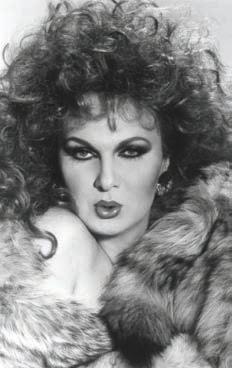


Rick Paul
Rick Paul, born in 1945, started his activism in 1971. He was working as stage manager of a drama arts camp when he sabotaged the sound as a comedian tried to tell homophobic jokes. On his way to the 1979 National March on Washington for Lesbian and Gay Rights, he met veteran George Buse, who was telling stories about his experience in World War II. Paul suggested a play would be great, and Lionheart Gay Theatre Company was born.
Paul has worked for more than 40 years as a scene designer for theater and film. “My work has been seen in every state and on other continents as well. I also produced, acted, wrote, and directed for theater,” he said.
At Lionheart, Paul writes: “We put ourselves totally as a service to all the organizations of the time. Giving 100 percent of the box office to the groups each of our 40 productions was benefiting.”
Chilli Pepper has been a performer in Chicago since the early 1970s, primarily at the Baton Show Lounge. She transformed the concept of drag, and in the process became a transgender icon, appearing on dozens of television shows and other broadcasts, including popular 1980s and 1990s talk shows.
Pepper was Miss Chicago in 1974, and the first Miss Continental, one of the top transgender pageants in the world, created by the Baton’s founder, Jim Flint.
As Zackary Drucker wrote about Pepper for Vice: “Chilli’s iconic onstage persona, which she refers to as her ‘cartoon,’ is soulful, unapologetic, and disinterested in anyone else’s judgement. In 2015, I encountered the electrifying presence of Chilli Pepper in the flesh for the first time the same way millions of people before me discovered her, on the stage at the Baton Nightclub. Living up to her name, she looked to be on fire, pantomiming, shifting through emotions; her fluid movements seductive and self-possessed; an artist in her zone. . . . For those in the LGBTQ Chicago nightlife universe, Chilli is the ultimate star, famous for her ostentatious jewelry and impeccable style. But speaking with Chilli, I was struck by her deep tranquility and reflection, as well as her reverence for fellow performers at the Baton, past and present.”
Rich Pfeiffer
Rich Pfeiffer is best known as coordinator of PRIDE Chicago, which has organized the annual Pride Parade from the early 1970s through the present day. Other organizational involvement from the 1970s through 1980s includes the Chicago Gay Alliance, Gay Horizons (now the Center on Halsted), the Gay Speakers Bureau, campus gay groups at Harold Washington College and the University of Illinois-Chicago, and a gay couples networking group. He was also a writer and columnist for Chicago Gay Crusader and Gay Life newspapers.
During the 1980s and 1990s, he was a member of the Mayor’s Advisory Council on LGBT issues under three different mayors. Pfeiffer has been with his life partner, Timothy Frye, since 1971, and together they contribute to various LGBTQ causes.
Mark Sherkow, born in 1945, came out in the summer of 1969.
“I came to Chicago in August 1967 to start a Master’s degree program at the University of Chicago,” he said. “I came out after my second summer in that area. Before I actually came out, I went to a gay dance held in a big room in a dormitory. It was jammed full of people and had signs such as ‘If someone asks you to dance and you don’t want to, then just say “no” and “You are beautiful.”’ I did not dance or talk to anybody but just sat and watched—and felt comfortable. A little while after that, I saw a news report on the CBS Evening News with Walter Cronkite about gay liberation, focusing on a gay dance at the University of Minnesota, and it gave me the final push I needed to come out.”
Maxsonn “Max” Smith was born in 1954 and became interested in Stonewall almost immediately. The Saint Louis Post-Dispatch ran a picture of the riot on its cover with a brief caption and no accompanying story, “Yet it made me feel very hopeful,” he said.
“I came out at the first Michigan State University Gay Liberation Council meeting, freshman year, in September 1972,” Smith said. “Donald Goddard and Jane Phillips led the 25 to 35 people attending weekly meetings. Gay Lib scheduled panel discussions with many classes. The East Lansing, Michigan, city council voted three yes, two no, on Monday, April 16, 1973, to pass America’s first gay rights law.”
Smith has been an activist in Chicago’s LGBTQ community for decades, including work empowering African American gay men through such groups as Adodi.
David Stienecker was a critical 1960s and early 1970s Chicago activist who fought back against police harassment. He was arrested for writing about a specific police officer in the Mattachine Midwest newsletter. He later moved to New York.
He told the Reader: “The first public Gay Lib event I participated in was a protest four months before the Stonewall march, on the snowy afternoon of Wednesday, February 25, 1970, outside the Loop headquarters of the Women’s Bar Association of Illinois. The group was hosting a program on youthful offenders with a Chicago police officer, Sergeant John Manley, as guest speaker. But for us, the offender was Manley himself. The blond, muscular cop was notorious for entrapping gay men in Lincoln Park restrooms; wearing street clothes, he would pretend to solicit guys for sex and then arrest them if they responded to his invitation.
Mattachine Midwest, an established ‘homophile’ organization in town, published Manley’s picture in its mimeographed monthly newsletter and mockingly suggested Manley himself was a closet case. . . . On February 7, 1970, Manley made an early morning appearance at Stienecker’s third-floor apartment to arrest him for criminal defamation.
“After I unsuccessfully attempted to make a phone call, Manley called for a police van and I was escorted from my apartment in handcuffs,” Stienecker said. The case was eventually thrown out, but Stienecker lost his job as an editor at World Book Encyclopedia
Marge Summit, a legendary bar owner and activist, was born in 1935 and came out of the closet 13 years later: “I knew I didn’t want to play with dolls, but loved wearing six-guns.”
In the mid-1970s, Summit helped Guy Warner start a Chicago group that is now known as PFLAG, Parents and Friends of Lesbians and Gays.
In the 1980s, as owner of His ’n Hers bar, she welcomed people from all parts of the LGBTQ community for food, music, and fun. She held a famous open mike for gay musicians to have a stage for their music, and produced an album called Gay and Straight Together. It is in the Smithsonian Museum.
Out of that bar, with fellow bar owner Frank Kellas, she launched the Gay $ campaign, where individuals and businesses stamped currency. Summit and Kellas experienced pressure from federal officials for their efforts, but it raised visibility for the community, Summit also fought the city of Chicago to adopt a child in the 1970s, and started a group called QED, which included gay men and women running benefits at the bar to raise money for organizations.



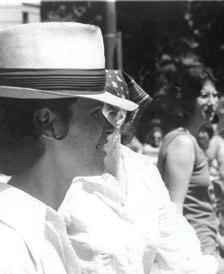

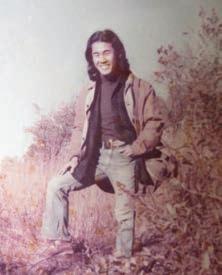

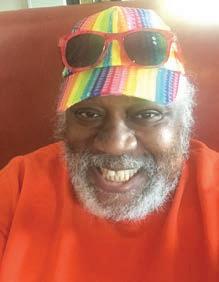
Kathleen Thompson
Kathleen Thompson, born in 1946, was the owner of Pride & Prejudice bookstore on Halsted in what is now Boystown, from 1970 to 1973.
“The early 1970s were an exciting time to be a part of the gay community, although being bisexual was controversial and often uncomfortable,” she said. “My feminist bookstore, Pride & Prejudice, was a center of activism and eventually turned into the Women’s Center. As the Center became more separatist, I fought the attempts to exclude women who had connections with men. Eventually, the group got very small, and I didn’t bother anymore. I just left.
“The best things were Susan B.’s restaurant, Marie Kuda’s lesbian writers’ conferences, and the parades.
“I barely knew Stonewall happened. In 1969, I had approached one woman sexually and been politely refused. A year later, I was very different. I had opened Pride & Prejudice, and was sleeping with [a woman]. By 1971, I had met Marie Kuda, who began to educate me. A year later, I encountered Penny Pope and Irene Lee, Millie Leonard, and other women in Chicago Gay Liberation, Women’s Caucus. They all knew what Stonewall meant, and I learned.”
Guy Warner was one of the founders of the first support group for the parents and friends of members of the LGBTQ community in Chicago, in the 1970s. The group later became part of the national PFLAG movement. Warner was also involved in other critical 1970s groups, including a coalition of gay and lesbian groups and businesses. He served as president of Mattachine Midwest, and the LGBT Hall of Fame credits him with “reinvigorating” the group.
Roy Wesley, born in 1942, experienced the early years of the Japanese internment camps the U.S. created during World War II, something that shaped his life of caring about social justice. He came out as gay in 1970.
“It’s hard to remember that 50 years ago America was not accepting of LGBT peo-
ple,” he said. “I was part of that culture, and hid being gay to all except those men who had the same strong urges that needed to be expressed. Pleasure and happiness were surrounded in guilt and shame. I’m so grateful times have changed thanks to Oscar Wilde, Lambda Legal, SAGE, Windy City Times, and so many others!”
Albert Williams was born in 1950 and came out in 1969. “As a student at Columbia College Chicago in the early 1970s, I was involved in two movements that blossomed in that era and fueled each other—Gay Liberation (we organized the first Stonewall anniversary march, among other activities) and the Chicago off-Loop theater scene (as a member of the Chicago Free Theatre)—which paved the way for my career as a journalist and teacher in the 1980s and continuing today.”
Donald Bell, born in 1949, said he first came out in September 1968.
“I was a 19-year-old university student returning to my sophomore year when I had my coming out experience,” he said. “I had lived a heteronormative life, as had most men then, and even had a steady girlfriend from home who had just become my fiancée over the summer.When I returned to campus early as an orientation leader, I met my resident advisor and fell in love at first sight. That began a special relationship that has lasted over 50 years.
“I first had to come out to myself, and that was not romantic it was traumatic! My identity exists at the intersection of race and sexual orientation, so it has never been a singular issue. Being gay, although it had been decriminalized in the state of Illinois in 1961, could still get one summarily dismissed from the university since the U.S. Supreme Court had not yet established that due process applied to public colleges. That could cost the loss of a student deferment and land one in Vietnam. As if the threat to one’s person personal and professional life wasn’t sufficient, homosexuality was still in the DSM [Diagnostic and Statistical Manual of Mental Disorders] and could result in mandated mental health treatment. At least these things are no longer at risk today. That’s progress!”
PHOTO CREDITS: Mama Gloria photo by Kate Sosin; Armand Cerbone photo by Hal Baim; Gary Chichester and his late partner, Patrick Jordan, at a Daley Center gathering circa 1974. Photo courtesy of Chichester; Murray Edelman with the megaphone at the first gay liberation rally in Chicago in April 1970. Photo by Margaret Olin; Tom Gertz at Mattachine Midwest meeting in early ‘70s. Courtesy M. Kuda Archives; Lucina Kathmann at the Istanbul Gay Pride Parade in 2015, the last of such event before a crackdown. Kathmann (right) is pictured with Gulsen Yagmurdereli. Courtesy of Kathmann; Lola Lai Jong photo by Hal Baim; Rick Paul (left) with Lionheart members, circa 1980 at the Pride Parade. Courtesy M. Kuda Archives; Rich Pfeiffer photo by Ross Forman; David Stienecker photo by Tracy Baim; Albert Williams in Dangerous Teachings: Songs of Exile and Revolution, Chicago Free Theatre, 1973. Courtesy of Williams. All other photos courtesy of subjects.

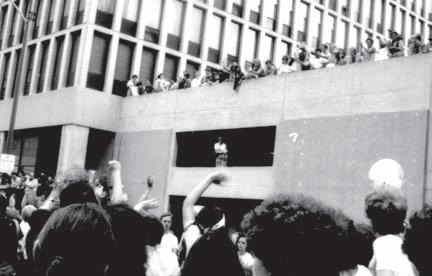
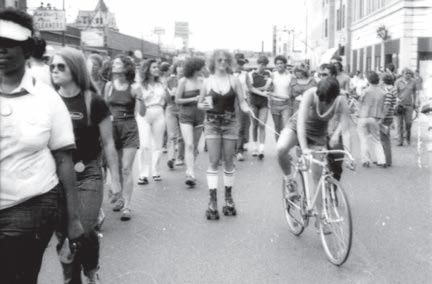

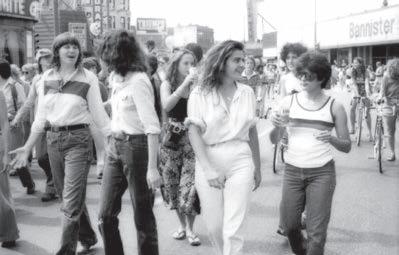
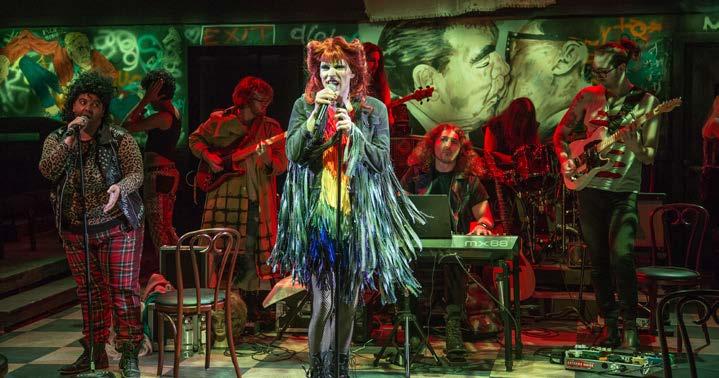
REVIEW
Hedwig and the Angry Inch AUSTIN D. OIE
Hedwig and the Angry Inch, up close and personal at Theo Ubique
By CATEY SULLIVAN
It hasn’t always been blindingly obvious that Hedwig and the Angry Inch is a ri on Plato’s “Symposium.” But the Greek fable it o ers about the origin of love is at the heart of this hard-rock musical by John Cameron Mitchell (book) and Stephen Trask (music and lyrics) about “a mere slip of a girly boy from Communist East Germany” who became “the internationally ignored songstress barely standing before you.”
The tale of Hansel Schmidt/Hedwig Robinson follows Plato via a score that celebrates and evokes the grand, gritty rebel glam of Lou Reed and Ziggy Stardust-era David Bowie among other gloriously “strange rock and rollers.” Since it debuted off-Broadway in 1998, I’ve seen more productions of Hedwig than I can readily recall. The most recent incarnation, directed by Toma Tavares Langston at Theo Ubique, is not one I’ll soon forget.
Anchored by Will Lidke in the title role, Hedwig is a binary-breaking ode to survival and hope. It’s all-consuming, from the crackling, electrified “My Country, ’Tis of Thee” vamp at the top of the show to “Midnight Radio,” the lighter-waving anthem that closes it.
Moreover, Theo Ubique’s shabby-glam, ultra-low-budget aesthetic and uber-intimate Evanston theater makes Hedwig up close and personal in a way that was impossible when the show played Broadway (and Broadway in Chicago) palaces. Unlike more amply funded
RHEDWIG AND THE ANGRY INCH
Through 7/28 : Thu-Sat 7: 30 PM, Sun 7 PM, Theo Ubique Cabaret Theatre, 721 Howard St., Evanston, 773 -347-1109, theo-u.com , $ 39-$ 54, $ 34$ 44 students and seniors, dinner $25 extra.
Hedwig s, this one doesn’t have a complex light grid to provide kaleidoscopic distraction or an overdesigned car wreck set to pull focus away from the performers. Instead, our attention is all on Hedwig, and in Lidke’s performance, she’s lit from the inside out, a nova of charisma.

continued from 21
But let’s get back to Plato. Per Alcibiades, one of the speakers at the symposium in question, Earth was once a paradise populated by two-gender creatures. But these perfectly completed beings amassed too much power, so Zeus split them all in half with lightning bolts. Rent asunder, humans became doomed to spend their lives in search of their missing halves. For Hedwig, that search means a botched surgery to become a woman (leaving the “angry inch” of the title), a quickie marriage to an American GI, and then abandonment by the same in a Kansas trailer park.
Except as Lidke makes clear, nobody puts Hedwig in a corner, even when her songs have been stolen and her heart broken. Both happen at the hands of Tommy Speck (Jacob Gilchrist), who capitalizes on Hedwig’s songwriting skills and reinvents himself as rock star Tommy Gnosis. Tommy can fill arenas and dominate headlines. Hedwig will fill your heart.
The band’s growling bass undertow and buzzing steel-guitar strings could overwhelm less assured vocals, but Lidke maintains dominance throughout, sometimes with a bellowing rebel yell, sometimes with a falsetto as delicate as spun silver. You can gauge any Hedwig by the way the lead performs the ballads, and Lidke delivers them with the ferocity of Zeus hurling lightning. “The Origin of Love” is the sound of hearts shattering. “Midnight Radio” rolls over the theater like a benediction. “Sugar Daddy”
sets toes tapping along with its gleefully obscene metaphors. “Wig in a Box” has the insouciant lilt of a mischievous child with a boundless imagination, an uncompromising eye for style, and the unshakable certainty that the bluest moods can be mitigated by a snazzy new coi ure.
Hedwig isn’t alone onstage. Brittney Brown plays Yitzhak, a former drag queen much used and abused by Hedwig as the two tour together. When Brown snarls through the percussive anger of “The Long Grift,” you can hear Yitzhak’s strength and defiance. The foundation underpinning Hedwig is the Angry Inch band. Guitarists Jakob Smith and Perry Cowdery, bassist Joseph Drzemiecki, drummer Carlos Mendoza, and music director Jeremy Ramey on keys play with hairwhipping, head-banging, foot-stomping joy. The yowling strings on “Exquisite Corpse” will set your neurotransmitters vibrating like tuning forks; the thrust propelling “Tear Me Down” is volcanic.
Straddling genders and countries, Hedwig is micro and macro, a character and a symbol. Theo Ubique’s production shows both the individual looking for love in a strange new world and a fledgling country unsure of its place in that strange new world. Either way, this Hedwig closes over your head like water, the music flooding your neurotransmitters. It’s an affirmation that cannot be denied and that will (per the lyrics) hit you hard and fill you up. v
@CateySullivan

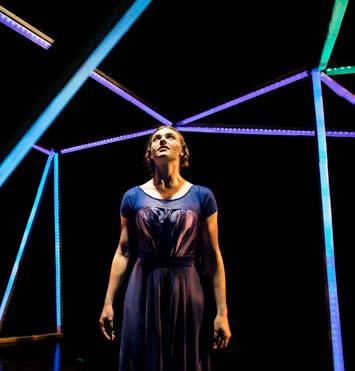
Ada and the Engine is more mechanical tool than finely calibrated dramatic device.
I suppose it would be difficult not to make a mechanical engine the central metaphor of any play about Ada Byron Lovelace. Daughter of the great Romantic poet Lord Byron, she so excelled in mathematics that she surpassed the era’s preeminent mathematician, Charles Babbage, by recognizing the potential his Analytical Engine (arguably the first modern computer) had beyond number crunching. Where Babbage saw numbers only as quantities, Lovelace saw them as units in any system of relational meanings—musical notes, for example—upon which the Engine could operate. In essence, she foresaw universal computing a full century before it came to be.
means of finding family and acceptance.
The play begins with Gringo deciding to start a dance crew with some of his friends from school. What follows is a series of dance sequences and nonsensical scenes in which the teenagers navigate the rough neighborhoods of Chicago and grapple with the onset of early adulthood. Yet despite González’s best efforts to bring nuance to certain topics such as the AIDS epidemic and gang violence, the scenes all felt rushed and the dialogue felt juvenile. More than anything, the seriousness of these issues was undermined by more dance numbers.
As someone who grew up listening to house music and hearing stories from my parents about how great the night scene was in the 80s, I thought the play captured the soul of the period perfectly. Every song made me feel nostalgic for a time I’ve only ever experienced through stories, which is what is expected from a period piece. I only wish UTC had placed as much emphasis on the topics that deserved more modulation as it did on the dance numbers. —MARISSA DE LA CERDA BACK IN THE DAY Through 8/3: Thu-Sat 8 PM, Sun 4 PM, Chopin Theatre, 1543 W. Division, 312-767-8821, urbantheaterchicago.org , $35.
Buy a Flex Pass and get six tickets for $144. Choose your show, choose your night, choose how many tickets you want to use, choose your seat!
Throughout the year, Pride Arts will be pairing great American writers with exciting new talent! The rest of our 2019 will include work by Harvey Feirstein (CASA VALENTINA), Terrence McNally, Lynn Ehrens, and Stephen Flaherty (A MAN OF NO IMPORTANCE), and Larry Todd Cousineau (ALL THAT HE WAS and AMERICA’S BEST MISFIT TOY.)
It’s heady stuff, which playwright Lauren Gunderson renders without a trace of smartypants abstraction, instead capturing the intellectual thrill that fired Lovelace beyond the social limits imposed upon women of her time. But Gunderson’s play is itself a kind of mechanical engine, its inputs largely limited to schematic oppositions between and within characters: romance vs. logic, passion vs. propriety, vision vs. convention. Despite intricate performances from Brookelyn Hébert as Lovelace and John Mossman as Babbage, the first 90 minutes of this two-hour drama feel more like the spinning of gears than the unfolding of lives. Director Monica Payne’s crystal-clear production could benefit from a healthy injection of ambiguity.
That is, until Gunderson sends her entire play into puzzling obscurity, chasing her protagonist into the heart of a glowing, talking, singing computer somewhere in the a erlife. It’s a finale that’s all detour and no arrival. —JUSTIN HAYFORD ADA AND THE ENGINE
Through 8/4: Thu 7:30 PM, Fri-Sat 8 PM, Sun 3 PM; no performance Thu 7/4, the Artistic Home, 1376 W. Grand, 312-243-3963, theartistichome.org , $34.
Urban Theater Company re-creates the house music scene from Back in the Day
The house music scene that dominated Chicago in the 80s comes alive again at the Chopin Theatre, which the Urban Theater Company has transformed into a nightclub with neon lights, jungle juice, and battling dance crews. Based on José “Gringo” Echeverria’s memoir The Real Dance Fever: Book One, The Beginning and written by UTC artistic director Miranda González, who codirected with Raquel Torre, Back in the Day follows the north-side dance crew the All-Stars and their frenemies the Culitos and Imported Taste as they use dance as a
Something Clean looks at the a ermath of a rape trial from an unexpected angle.
The 2016 Brock Turner rape trial, which ended with Turner receiving a slap-on-the-wrist six-month sentence for assaulting an unconscious woman, is the obvious antecedent for Selina Fillinger’s Something Clean, now in a coproduction from Rivendell and Sideshow Theatres. But the rapist never appears in Fillinger’s drama, which focuses instead on his parents. Charlotte (Mary Cross), the mother, volunteers at a center for sexual assault survivors, where she forms a friendship with Joey (Patrick Agada), a gay survivor and counselor whose own mother kicked him out as a teen when he told her about being raped by a male babysitter. Meanwhile her husband, Doug (Guy Massey), amps up his workaholism and fumbles for ways to reconnect with Charlotte. Lauren Shouse’s taut staging brings out the best in all three actors. However, there are some narrative elements that strain credulity—mostly, that Joey never delves too deeply into Charlotte’s real identity (she goes by “Charlie”) or recognizes her from the media-saturated trial of her son. The cleansing metaphors (Charlotte is a neat freak—bad luck for someone whose life has gone to shit) also get heavy-handed. But Something Clean gets some good shots in at quick-fix concepts of closure, healing, and even justice itself. We learn that Charlotte told her son’s jury that “a few moments of poor judgment do not erase everything a person was or define what he will be.” By the end, it’s clear that she needs to find a new way to define herself, away from the men in her life she’s never fully understood. —KERRY REID SOMETHING CLEAN Through 7/21: Thu-Sat 8 PM, Sun 2:30 PM; also Tue 7/2, 8 PM, and Sat 7/13, 2:30 PM; no performance Thu 7/4, Victory Gardens Theater, 2433 N. Lincoln, 773-871-3000, victorygardens. org , $20-$30, $15 students and seniors. v
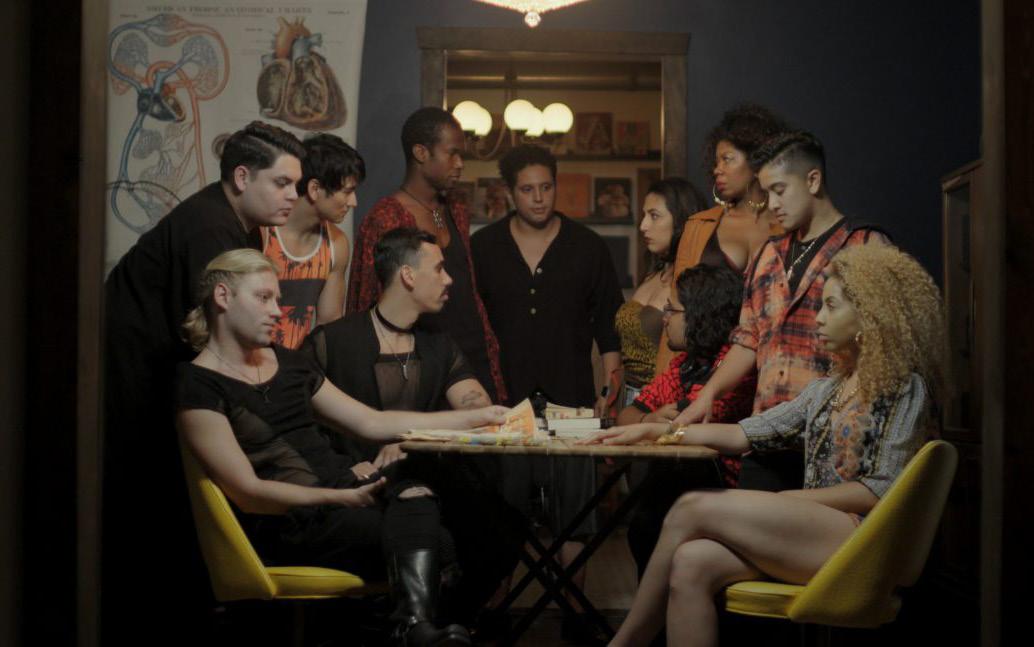
By S. NICOLE LANE
In 2019, LGBTQ television has never been better. According to GLAAD, one in 11 or 8.8 percent of characters on scripted prime-time shows identify as LGBTQ, which amounts to more than 100 more than there were last year. This means more representation, inclusivity, and accuracy and television content that will continue to break down barriers and highlight a variety of identities across all spectrums. Here are ten of the most influential shows airing right now.
The L Word pioneered portrayals of many LGBTQ identities on television: the first interracial lesbian couple, the first regular transgender character, and the first deaf lesbian. It’s a classic for messy lesbian drama and chaos. A reboot is in the works for late 2019.
The Italian webseries G&T starts with the reunion of two college friends who shared an intimate moment five years ago. It addresses homophobia, coming out, self-identity, and concerns surrounding civil unions in Italy with exaggerated drama and lots of romance.
Lena Waithe’s reboot of the 1992 movie Boomerang has two Black queer characters in the Eddie Murphy and Robin Givens roles, one a bisexual masc man, something rarely seen on television. Airing on BET, Boomerang illustrates all identities: trans, nonbinary, butch, femme, and also drag performers. It’s special
Brujos
as Mary Ann from the original 1993 TV miniseries, along with Ellen Page, who plays her daughter.
Élite is a teen drama on Netflix that covers several bases: polyamory, sex, HIV, bribery, and murder. It’s centered around a group of low-income students who have received a scholarship to an elite Spanish prep school. What follows is surprisingly queer (and very binge-worthy).
Jo and Carter, a white trans woman and a queer Black man, are the former lovers and current best friends at the center of The T. The webseries follows their lives in Chicago. There is still very little trans representation in TV, and The T may just be what we have all been waiting for.
And of course, there’s Pose, the flashy and gaudy FX drama series set in the 1980s that follows the New York City ball subculture with choreographed dancing and a wide range of LGBTQ characters who are actually portrayed by real LGBTQ actors. v

to see Boomerang do what other shows have not: depicting the the diversity within the Black queer community.
Two Mexican-American sisters return to their childhood home in LA after their mother’s death in Starz’s Vida, and join in the fight over gentrification. Latinx queers are seldom represented in mainstream media, but Vida pushes those voices to the forefront.
The Chicago-based webseries Brujos follows four gay Latino grad students—who also happen to be a coven of warlocks—as they try to survive being hunted by wealthy white men. Mixing horror and humor, Brujos is an allegory for a heteronormative society and white supremacy.
Anissa Pierce (or Thunder) is a lesbian medical student and metahuman in the CW show Black Lightning, based on the DC comic. Her ability to withstand flying bullets is used as a symbol for sexual awakening and is linked to many “coming out” moments in the second season.
Armistead Maupin’s cult classic Tales of the City followed Mary Ann Singleton, who moves from the midwest to San Francisco, where for the first time she experiences drugs, a range of gender identities, and the LGBTQ community. A reboot premiered this month on Netflix and features Laura Linney, reprising her role



King Hu’s martial arts classic The Fate of Lee Khan is the most fun you’ll have at the movies this summer.
By BEN SACHS
Idoubt that a more entertaining film will play Chicago this summer than The Fate of Lee Khan (1973), which screens three times this week at the Gene Siskel Film Center in a new digital restoration. Lee Khan may not be the greatest work by director King Hu (that would be either Dragon Inn or A Touch of Zen), but it contains so many pleasurable moments that it may be his most satisfying to watch. The film comprises a thrilling mix of comedy, action, and intrigue, combining the joys of multiple genres into a seamless whole. It also centers on the exhilarating—and ever-timely—theme of liberation, not only with regard to oppressed societies in general, but to women in particular. The Chinese-born Hu (who made many of his best films, including this one, in Taiwan) has been justly celebrated for his strong female characters, and Lee Khan contains a good half dozen of them; the women here are assertive, independent, and great fighters to boot. Yet one of the more remarkable things about the film is that it never
pronounces its themes too obviously. They’re integrated gracefully into the action, propelling the drama with subtle moral force. The central conflict of Lee Khan is political as well as moral, and Hu establishes it right away. The year is 1366, and 100,000 rebel soldiers are currently engaged in a war with the army of the oppressive Yuan Dynasty. The title character is the leader of the Yuan army, and with just a few terse lines of narration, Hu reveals him to be shrewd, ruthless, and cruel— you find yourself rooting against him before the action even begins. After introducing Lee Khan (Feng Tien) and his equally villainous sister, the Princess Lee Wan-erh (Feng Hsu), Hu cuts to the film’s central location: Spring Inn, a restaurant-cum-gambling den located in the middle of the northern Chinese desert. Mr. Liu (Nan Chiang), one of the inn’s owners, tells his partner Wan Jen-mi (Li Hua Li as one of Hu’s most noble heroines) that Lee Khan and his men plan to reconnoiter at the establishment before staging a battle against rebel
THE FATE OF LEE KHAN ssss Directed by King Hu. In Mandarin with subtitles. 106 min. Fri 6/28, 8 PM; Sat 6/29, 3 PM; and Wed 7/3, 6 PM. Gene Siskel Film Center, 164 N. State, 312846 -2800, siskelfilmcenter.org , $12
troops stationed nearby and whose secret war plans now rest in the villains’ possession. But the resourceful Wan is already aware of this and has prepared for Lee Khan’s arrival. She’s already hired four resistance fighters to pose as serving girls at the inn with the aim of subverting the general’s visit.
Hu and company take evident delight in setting the scene; indeed Lee Khan succeeds grandly as a workplace comedy before any major suspense occurs. A master of widescreen composition, the director finds endless ways to present Spring Inn, organizing the employees and their guests in all sorts of dynamic compositions. Hu also stages graceful dolly shots through the inn, conveying a restless sense of movement (which prefigures the exciting fight scenes to come) even when the characters are sitting still. The serving girls all have criminal pasts, and the film generates big laughs in the way they raucously fend o the advances of rowdy male customers. Hu stages a pleasing bit of physical comedy as well when Lilac, a former pickpocket, steals a large pearl o the hat of a gambler, then surreptitiously returns it when Wan Jen-mi catches her in the act. Several of the guests inspire good cheer too, particularly a wandering troubadour who improvises songs about how much he dislikes the inn’s food.
The character comedy quickly gives way to action when three swordsmen show up and try to rob the inn. Wan Jen-mi and the serving girls retaliate in a flash, revealing themselves to be expert martial arts fighters as they chase o the robbers. The scene, which anticipates the movie’s breathtaking climax, is a little showcase for the fight choreography of Sammo Kam-Bo Hung (credited here as Chu Yuan-lung). It also features one of Hu’s most delightful innovations: when the actors jump or flip through the air, they seem like they’re taking flight, thanks to Hu’s use of hidden trampolines. Once the director and company bend the laws of physics, it seems like anything can happen in Lee Khan, and in fact the serving girls soon execute some more remarkable stunts when they intimidate a couple of guests who are cheating at the gambling table.
Hu punctuates the action-comedy with moments of great suspense, which he achieves, in Hitchcockian fashion, by attaching narrative weight to the smallest details. Liu tells Wan Jen-mi early on that not only is Lee Khan sending spies to Spring Inn in advance of his visit, but that more undercover resistance fighters
are on their way too. The anti-imperial fighters will reveal themselves, Liu explains, by paying their hostesses with specially marked coins, and this bit of information imbues every time a customer takes out money with a sense of breathless anticipation. Hu achieves similar e ects with small objects later in the film when Lee Khan and his entourage show up and the team of resistance fighters works together to retrieve the stolen rebels’ plans from a locked chest in the general’s room. This passage, which occurs after all the guests have revealed their true natures, merits comparison with the revered wine-cellar sequence in Hitchcock’s Notorious (1946), as Hu cuts brilliantly between Lee Khan’s room, where one of the serving girls tries as quietly as possible to break into the chest, and the dining area of the inn, where the other rebels cunningly distract the general’s men. Many critics have noted that Hu helped rejuvenate the wuxia genre by incorporating lessons of Hollywood-style editing, and I’d argue that his success in this area was seldom more e ective than it is here. Hu rarely employed his artistry for its own sake—it was always in the service of advancing narrative and theme—and the plan-stealing sequence is masterful in how it moves the story forward and crystallizes the film’s core subject of teamwork. That theme reaches its fruition in the final 15 minutes of Lee Khan, a breathless succession of swordplay and martial arts fighting that represents some of the most joyous filmmaking in the history of action cinema. Without revealing the identities of the rebel spies and Lee Khan’s men, let me say that all the characters acquit themselves daringly, each one displaying willingness to sacrifice him- or herself for their cause. Hu clearly favors the rebels (Lee Khan wouldn’t be such a rousing experience if he didn’t), and his preference can be felt in how he characterizes the hero as a group, which honors the concept of collective resistance to tyranny. (By contrast Lee Khan and Lee Wan-erh are dominating, larger-than-life presences, which speaks to the power-obsessed evil of tyrants.) The director still grants entertaining traits to each of the heroes and heroines; Lee Khan exudes charisma in the headstrong assertiveness of the serving girls and the devil-may-care bravado of their male counterparts. The many fun behavioral details add enjoyment to what is already an embarrassment of pleasures. v @1bsachs
WILD
Directed by Tom Harper. R, 101 min. Fri 6/28 -Sun 6/30, 11: 35 AM, 2:15, 5:05, 7: 50, and 10 : 20 PM; Mon 7/1-Thu 7/4, 2:15, 5:05, 7: 50, and 10 : 20 PM. Century Centre, 2828 N. Clark, landmarktheatres.com, $12 50

In Wild Rose, a Glaswegian with her heart in Nashville aspires to become the queen of country music.
By ANDREA GRONVALL
It’s hard to believe that a genre as vital to American popular music as country (and its cousin, country and western) had a bad rap for a while among many dwellers in major northern cities, who looked down their noses at what they mistook as simple tunes for the unsophisticated. Musical forms come and go, of course; for instance, the big-band era, born in the midst of the Depression, effectively ended with the close of World War II, yet its sound recently has been making a comeback. But country music is singular in that it has long had a distinctly regional flavor. It reflects the values of tight-knit small-town or remote communities where home and family are paramount, and often expresses a world-weary lament for bygone better days. Historically it has addressed class issues and hard times, which may in part be why, in a society where the gap between the haves and the have-nots is growing exponentially, this musical format is again robust, extending its appeal well beyond rural areas.
Witness the revival of bluegrass, an acoustic o shoot of country that informed one of the
Coen brothers’ best films, O Brother, Where Art Thou? (2000), and the enduring influence of 1960s and ’70s country rock: among the top-ten touring music acts last year, country rocker Kenny Chesney grossed $114,333,176 on the road, pretty impressive when compared to globally popular U2’s $119,203,900 take. And now riding country’s groundswell comes a rousing indie movie from the UK, director Tom Harper’s Wild Rose , about a working-class unwed mom who dreams of chucking her dead-end lifestyle in Glasgow for Nashville stardom. The movie speaks—and sings—volumes about heartache and cherished dreams, the stu of which country is made.
Irish actress-singer Jessie Buckley (Beast, HBO’s Chernobyl) is a knockout as music-mad, redheaded twentysomething Rose-Lynn Harlan, a bombshell not just because of her looks and irrepressible spirit but also because of the chaos that follows wherever she goes: impulse control is not among her talents. Newly released after a yearlong prison stretch for heroin possession, the aspiring country singer makes a beeline for the arms of her boyfriend; only later does she head home to
her disapproving mother, Marion (Julie Walters), who was left to care for Rose-Lynn’s two young children, Wynonna (Daisy Littlefield) and Lyle (Adam Mitchell). Their reunion is not exactly joyous, because more than anything the irresponsible Rose-Lynn would rather be in Tennessee.
The artist as a train wreck waiting to happen is a familiar subject in movies about country, from Je Bridges’s Bad Blake in Scott Cooper’s Crazy Heart (2009) to Bradley Cooper’s reiteration last year of A Star Is Born to biopics like James Mangold’s Walk the Line (2005), about Johnny Cash, and Marc Abraham’s I Saw the Light (2015), about Hank Williams. When women are in the spotlight, the scripts often revolve around love, marriage, and children almost as much as the music, as in Michael Apted’s Loretta Lynn biopic Coal Miner’s Daughter (1980), Karel Reisz’s Patsy Cline biopic Sweet Dreams (1985), and Felix van Groeningen’s drama about Belgian bluegrass singers in love, The Broken Circle Breakdown (2012).
Wild Rose has a foot in both camps, with Rose-Lynn both wanting and resisting

continued from 25
reconciliation with her family as she recklessly plows ahead, grasping at any opportunity to make it big. She uses people, beguiling them with her charm and pluck while dissembling or outright lying through her teeth. She breaks promises to her children, who so yearn for her love. She disses her parole advocate in court, correcting him that she is a “country”—not “country and western”—singer. (That distinction seems to rest largely on orchestrations, simpler string instruments like banjo, fiddle, guitar, autoharp, and dulcimer for country versus instruments with a bigger sound, like steel guitar, slide guitar, and drums for country and western.) Before long Rose-Lynn takes advantage of the woman whose house she cleans, an upper-crust Anglo African culture lover (Sophie Okonedo) who bankrolls her trip to London to meet a top music broadcaster (BBC Radio 2’s Bob Harris, playing himself). He advises her to write her own songs; she has doubts.
In her obsession to get to Nashville—she claims she is not Scottish but American in her soul—what Rose-Lynn doesn’t realize is that her life is one country song writ large. It’s not at all strange that a Glaswegian could so identify with American country music, given that the format’s roots are in the English, Irish, and Scottish folk ballads that early immigrants brought with them when they settled along the Atlantic seaboard and in the south. “Three chords and the truth” is her motto, tattooed on her arm, but even though the pain and longing in her beautiful voice are real, like many a complex, dysfunctional personality she has trouble facing the truth about herself. Harper, who previously directed Buckley in the 2016 BBC-TV miniseries War & Peace, has spoken of his rapport with his star, as has screenwriter Nicole Taylor, who worked with her on writing lyrics for some of this film’s original songs. The 29-year-old Buckley, who comes from a musical family, launched her career in 2008 competing on the BBC talent show I’d Do Anything , which led that same year to a role in the West End revival of A Little Night Music . She clearly understands RoseLynn’s fire in the belly and her upward climb, and if the title character resolves her problems perhaps a little too tidily by the end, Wild Rose nonetheless feels authentic. Rose-Lynn might or might not ever be the next queen of country, but by facing adversity head-on and writing from the heart, she’s exactly why millions have embraced this music as their own. v

The third spin-off about the cursed doll from The Conjuring horror franchise, this sequel to Annabelle: Creation (2017) takes the series inside the Connecticut home of paranormal investigators Ed and Lorraine Warren (Patrick Wilson, Vera Farmiga) during a 24-hour period when the couple goes out of town and leaves their psychic ten-year-old daughter (Mckenna Grace, Captain Marvel) in the care of a perky and very resourceful high-schooler (Madison Iseman). Early on, while the tension gradually builds, the focus is more on humor, with Wilson and Farmiga playing their familiar roles slightly tongue-in-cheek and with sly references to teen comedies and stalker movies thrown in. But once the babysitter’s visiting best friend (Katie Sarife) furtively unlocks the doll’s glass cage, Annabelle breaks out, unleashing all the hell latent in the Warrens’ spooky artifacts room, including some unsettling new phantoms—corpses with coins on their eyes as payment to the Ferryman, the boatman to the a erlife. Cinematographer Michael Burgess puts the glow in Lisa Son’s 1970s-era set design: the earth colors and nature accents upstairs contrast effectively with the shadowy demon den below. Gary Dauberman, writer of all the films in this trilogy (here from a story by producer James Wan) makes a stylish directorial debut: this is an uncommonly handsome scary movie, one that respects the audience’s intelligence while delivering all the requisite chills and just the right amount of gore. With Steve Coulter and Michael Cimino as the adorable teen supermarket clerk aptly nicknamed “Bob with balls.”
—ANDREA GRONVALL R, 106 min. ArcLight, Century 12 and CineArts 6, Chatham 14, Cicero Showplace 14, City North 14, Ford City, Harper Theater, Lake Theatre, Navy Pier IMAX, River East 21, Showplace 14 Galewood Crossings, Webster Place 11
This 1991 first feature by writer-director John Singleton, then 23, about growing up Black in South Central LA, shows some genuine talent in handling character and action, and equal amounts of confusion and attitude when it comes to matters of gender and ghetto politics. (Black women seem to bear the brunt of his anger about
exile. Accused in 1935 of antifascist activities, Levi is sent to the mountain community of Lucania, a place beyond much of the influence of the modern age. Priests are suspect and ill respected, while the few middle-class representatives of government and order are seen as outside oppressors, as immutable as the other harsh facts of nature. Gian Maria Volonte gives an eloquent performance as the thoughtful Levi—this powerful actor is capable of an intricate subtlety of expression, so that our perceptions of Lucania are filtered through the actor’s consciousness as well as the character’s. With Paolo Boncicelli, François Simon, and Irene Papas. In Italian with subtitles. —DAVE KEHR 120 min. Showing in the full, uncut 223-minute version. Fri 6/28, 2 PM; Sat 6/29, 7 PM; Sun 6/30, 2 PM; and Thu 7/4, 2 PM. Gene Siskel Film Center
problems in the ghetto, and the white power structure is accorded a relatively free and guiltless ride.) With Ice Cube, Cuba Gooding Jr., Morris Chestnut, and Larry Fishburne. Stanley Clarke composed the score. Could the widespread popularity of this movie among whites be partially connected to the implicit acceptance of ghettos as an unchangeable fact of life? —JONATHAN ROSENBAUM R, 112 min. Fri 6/28-Sat 6/29, midnight. Music Box
Giovanni Pastrone’s 1914 film is one of several early Italian epics that significantly influenced the form and flow of the feature film, then in its developmental infancy. Extravagantly scaled (Pastrone imported elephants to the Alps to re-create Hannibal’s march) and with florid intertitles by Italian nationalist poet Gabriele D’Annunzio, Cabiria set a standard for lavishness and technical proficiency that no other film of the period, save Griffith’s Intolerance (in some ways a response to Pastrone’s masterpiece), was able to match. —PAT GRAHAM 148 min. 16 mm. Fri 6/28, 7 PM. Univ. of Chicago Doc Films
Part of what makes this wartime Hollywood drama (1942) about love and political commitment so fondly remembered is its evocation of a time when the sentiment of this country about certain things appeared to be unified. (It’s been suggested that communism is the political involvement that Bogart’s grizzled casino owner Rick may be in retreat from at the beginning.)
This hastily patched together picture, which started out as a B film, wound up getting an Oscar, and displays a cozy, studio-bound claustrophobia that Howard Hawks improved upon in his superior spin-off To Have and Have Not. Then again, we get Humphrey Bogart, Ingrid Bergman, Claude Rains, Paul Henreid, Conrad Veidt, Sydney Greenstreet, Peter Lorre, Marcel Dalio, and S.Z. Sakall, and Dooley Wilson performing “As Time Goes By.” —JONATHAN ROSENBAUM PG, 102 min. Fri 6/28-Mon 7/1, 10 PM. Logan
Also known as Eboli, Francesco Rosi’s 1979 film is an engrossing, o en lovely piece of work based on writer-painter Carlo Levi’s book about his two years in
With the possible exception of his cable miniseries When the Levees Broke, this 1989 feature is still Spike Lee’s best work, chronicling a very hot day on a single block of Brooklyn’s Bedford-Stuyvesant neighborhood, when a series of minor encounters and incidents leads to an explosion of racial violence at an Italian-owned pizzeria. Sharp and knowing, though not always strictly realistic, it manages to give all the characters their due. Bill Lee’s wall-to-wall score eventually loses some of its effectiveness, and a few elements (such as the patriarchal roles played by the local drunk and a disc jockey) seem more fanciful than believable. But overall this is a powerful and persuasive look at an ethnic community and what makes it tick—funky, entertaining, packed with insight, and political in the best, most responsible sense. —JONATHAN ROSENBAUM R, 120 min. 35 mm. Harper Theater, Music Box, River East 21, Showplace ICON
Well-made treacle (1989), adapted by writer-director Phil Alden Robinson from W.P. Kinsella’s novel Shoeless Joe A fledgling farmer (Kevin Costner) hears a voice in an Iowa cornfield and has a vision that convinces him that if he builds a baseball diamond in his field, Shoeless Joe Jackson, of the notorious 1919 White Sox, will turn up to play there. Other messages and signs follow, leading the hero to meet a former novelist in hiding (James Earl Jones) and a deceased ballplayer who ended his life as a doctor (Burt Lancaster). The strange mixture of nostalgia, poetry, pop mysticism, and innocence suggests both Ray Bradbury and Steven Spielberg, at their best as well as their worst; the conception is sentimental, but the storytelling remains assured and effective. With Amy Madigan as the hero’s sympathetic wife, Gaby Hoffmann as their daughter, and Ray Liotta as Shoeless Joe. —JONATHAN ROSENBAUM PG, 106 min. Wed 7/3, sunset. Gallagher Way F
This 2018 animated film set during the Cambodian genocide begins with a three-year-old boy’s separation from his parents while they are all trying to walk across a mine-studded river. Director Denis Do painstakingly depicts the mundane and extraordinary cruelties of the Khmer regime by utilizing a split narrative following the lives of both the son and his parents in separate labor camps a er their tragic estrangement. With tense, geometric animation and a lush, affecting soundtrack, this French-Luxembourgian-Belgian production has rightfully been compared to Isao Takahata’s Grave of the Fireflies in its ability to portray the horrors of war through a lens of deep intimacy. Luminous and
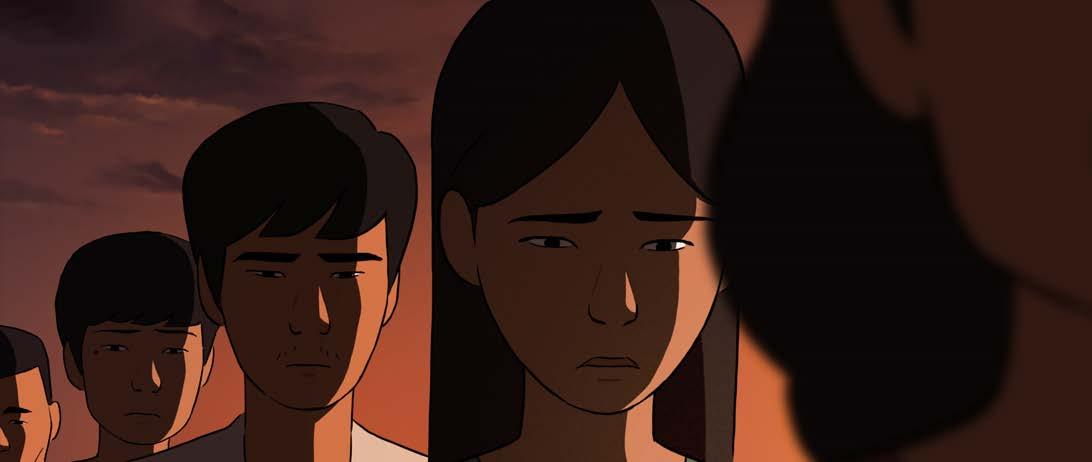
immersive, at times overwhelmingly so, this film is a realist’s ode to the hope that remains a er one has survived the unimaginable. In French with subtitles. —NINA LI COOMES 84 min. Fri 6/28, 4 and 6:15 PM; Sat 6/29, 5 PM; Sun 6/30, 3 PM; Mon 7/1, 8:15 PM; Tue 7/2, 6 PM; Wed 7/3, 8 PM; and Thu 7/4, 3 PM. Gene Siskel Film Center
Mamoru Oshii’s 2004 follow-up to his 1995 anime noir is that rare sequel that surpasses the original. In a futuristic dreamscape conjured with a mix of traditional and digital animation, cyborg detectives Batou and Togusa probe a series of murders committed by “gynoids,” female robots designed for sex. The pair are as erudite as they are hard-boiled: when they’re not gunning down yakuza thugs they’re speculating on the nature of being and consciousness and making references to Confucius, Plato, the Bible, and the legend of the golem. Their philosophical investigations lead them into the labyrinthine palace of a diabolical hacker with plans for the ultimate technological transformation of humankind. In Japanese and Cantonese with subtitles.
—ANDREA GRONVALL PG-13, 99 min. Sat 6/29, 7:30 PM. Logan
It broke box-office records in 1975, and probably posted an aesthetic landmark too—in proving that actors and characters were completely redundant in the shopping-center cinema of the 70s. Steven Spielberg’s mechanical thriller is guaranteed to make you scream on schedule (John Williams’s score even has the audience reactions programmed into the melodies), particularly if your tolerance for weak motivation and other minor inconsistencies is high. It spawned a number of imitations (including Grizzly, Day of the Animals, and the unforgettable Worms), most of which failed. But the formula has lived on in the Alien series and most contemporary films with aspirations toward suspense. —DAVE KEHR PG, 124 min. 35 mm. The Wednesday screening is an interactive “drink-a-long” event (21+). Wed 7/3, 7 PM, and Thu 7/4, 4:30 PM. Music Box
In case you’ve lost count, this is the fourth restoration of Fritz Lang’s 1927 sci-fi epic, begun in 2008 a er a 16-millimeter reduction print of the original cut was discovered in Argentina. Containing 25 minutes of previously lost footage that brings the movie back within eight minutes of its running time at its German premiere, this will probably wind up being the standard version. Some of the footage consists of mere reaction shots clipped from otherwise preserved scenes, but there are also completely new scenes that explain one minor character (the shadowy capitalist spy the Thin Man) and fill out a major relationship (between Joh Fredersen, lord of the futuristic city, and Rotwang, the outlaw scientist who creates the robotic woman). As the most complete representation of Lang’s original vision, it’s a masterpiece by any measure. —J.R. JONES 148 min. Live original score performed by David DiDonato. Sun 6/30, 7 PM. Music Box
Silly, sophomoric, and slapped together—but would you want it any other way? The Pythons’ second feature (1975) is full of things that even the relatively tolerant BBC wouldn’t allow—including real violence, real pestilence, real death, and other comic devices. TV’s 30-minute format may be better suited to the team’s fragile conceits (the killer bunny bit seems to go on forever), but for all the stretching the film never snaps. Look sharp for the Ken Russell hommages. Terry Jones and Terry Gilliam directed. —DAVE KEHR PG, 90 min. Fri 6/28-Mon 7/1, 11 PM. Logan
The last major work of the great American independent Shirley Clarke (The Connection, Portrait of Jason, The Cool World), this 1985 documentary about the innovative and singular jazz saxophonist Ornette Coleman finds her straining at times to match his eclecticism. (Among the interview subjects are William S. Burroughs
and Buckminster Fuller.) The film’s biggest limitation may be its focus on a single piece, “Skies of America,” through many performances and incarnations over a seven-year period, which stretch geographically from Fort Worth and Berkeley to Morocco and Italy—a good idea in theory, but the third-stream trappings of the piece make it less than ideal for this kind of workout. Still, this ambitious and affectionate effort to capture an elusive subject is undoubtedly worth a look.
—JONATHAN ROSENBAUM 90 min. 35 mm. Showing with Clarke’s short film Bridges Go Round (1958, 16 mm). Sun 6/30, noon. Univ. of Chicago Logan Center for the Arts F

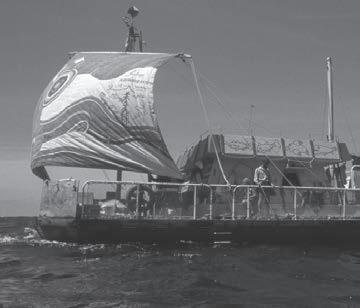
David Hockney in A
“Ripples with insights into identity politics and humanity under pressure.”
—Kevin Harley, The List “A

Get showtimes at chicagoreader.com/movies.
“This is the true story of seven strangers picked to live in a house, work together, and have their lives taped . . .” Before there was The Real World, before there was Survivor, there was a 1973 social experiment in which five men and six women boarded a small ra for 101 days on the Atlantic Ocean—all on camera, a reality show before reality shows. The experiment was conducted by anthropologist Santiago Genovés to study violence and sexuality. Genovés was also on board to interview his subjects—or, rather, provoke conflict. Relationships and disagreements quickly unfolded. Forty-six years later, the ra ers reunite in Marcus Lindeen’s documentary The Ra . The film explores the experiment in a unique way: interviews with surviving ra ers on a reconstructed version of the original ra combined with a voice-over reading entries from Genovés’s diary of the trip. The documentary never fully digs into the psyches of the participants or takes the viewer beyond the screen and onto the ra . However, The Ra remains a fascinating look into human relationships that’s even more relevant in the wave of sensationalized television. —NOËLLE
D. LILLEY
97 min. Fri 6/28, 2 and 8 PM; Sat 6/29, 3 PM; Sun 6/30, 4:45 PM; Mon 7/1, 6 PM; Tue 7/2, 7:45 PM; Wed 7/3, 6 PM; and Thu 7/4, 4:45 PM. Gene Siskel Film Center
Paul Thomas Anderson’s fi h feature (2007), a striking piece of American self-loathing loosely derived from Upton Sinclair’s Oil!, is lively as bombastic period storytelling but limited as allegory. The cynical shallowness of both the characters and the overall conception—American success as an unholy alliance between a turn-of-the-century capitalist (Daniel Day-Lewis) and a faith healer (Paul Dano), both hypocrites—can’t quite sustain the film’s visionary airs, even with good expressionist acting and a percussive score by Radiohead’s Jonny Greenwood. Day-Lewis, borrowing heavily from Walter and John Huston, offers a demonic hero halfway between Thomas Sutpen in Faulkner’s Absalom, Absalom! and James Dean’s hate-driven tycoon in Giant (shot on the same location as this movie), but Kevin J. O’Connor in a slimmer part offers a much more interesting and suggestive character. This has loads of swagger, but for stylistic audacity I prefer Anderson’s more scattershot Magnolia —JONATHAN ROSENBAUM R, 158 min. Tue 7/2Thu 7/4, 10:30 PM. Logan
Walter Hill’s existential action piece (1979), rendered in a complete stylistic abstraction that will mean tough going for literal-minded audiences. The straightforward, straight-line plot—a street gang must cross the length of New York City, pursued by police and rival fraternities—is given the convoluted quality of a fever dream by Hill’s quirky, claustrophobic direction. Not quite the clean, elegant creation that his earlier films were, The Warriors admits to failures of conception (occasional) and dialogue (frequent), but there is much of value in Hill’s visual elaboration of the material. With Michael Beck, Deborah Van Valkenburgh, and Thomas Waites. —DAVE KEHR R, 90 min. Fri 6/28-Mon 7/1, 10:30 PM. Logan
Barry Gifford’s beautifully written picaresque novel about southern lovers on the run, though essentially literary, could have worked as a movie had David Lynch shown some fidelity to the realistic context. Despite sev-
eral over-the-top interpolations—mainly references to Elvis and The Wizard of Oz and a nutty mobster straight out of Twin Peaks—Lynch manages to shoehorn in a surprising amount of Gifford’s material, but uses most of it like sofa stuffing. Nicolas Cage and Laura Dern give their all to the lead parts, but they’re handicapped by Lynch’s indifference to characters (as opposed to figures), and the other actors are used so narrowly that they’re mere icons. Willem Dafoe is outfitted with stumpy teeth and a pencil mustache a la John Waters, leading one to the grim hypothesis that the most aesthetically nuanced of the former midnight moviemakers is taking his cues from the least. At least Waters cares about most of his freaks; for Lynch they’re mainly exploitation fodder that seems to come straight out of junior high. (1990) —JONATHAN ROSENBAUM R, 124 min. 35 mm. Sat 6/29, 7 and 9:30 PM. Univ. of Chicago Doc Films
Sidney Lumet’s 1978 adaptation of Broadway’s all-Black musical resembles Saturday Night Fever more than The Wizard of Oz. There’s the same dark disco lighting, the same romanticization of urban rubble. And the theme is no longer “There’s no place like home” but a learningto-love-yourself homily that might have been li ed from Werner Erhard. Still, it’s one of the more competent neomusicals of the period, if only because of Dede Allen’s punchy editing and Tony Walton’s cavernous sets. A lot to look at, little to contemplate, and nothing to hum. With Diana Ross, Michael Jackson, Nipsey Russell, and a curiously restrained bit by Richard Pryor. —DAVE KEHR G, 134 min. Outdoor screening. Tue 7/2, 6:30 PM. Pritzker Pavilion, Millennium Park F
Director Danny Boyle (Slumdog Millionaire) and screenwriter Richard Curtis (Love Actually) have divergent cinematic sensibilities, but they meld well enough in this bittersweet, slightly wacky musical fantasy rom-com about an alternative universe where the Beatles never existed. In his first big-screen role—the lead, for which he became proficient at both piano and guitar—Himesh Patel (the BBC’s EastEnders) plays an aspiring singer-composer from Suffolk whose talent doesn’t match the size of his dreams. A er a freakish global blackout, he awakens to a world in which no trace remains of the Fab Four other than in his own memory, so he decides to pass off their songbook as his own. This turns out to be a smashing idea. Patel impresses with his musical ability and pleasing voice (all his performances were recorded live) as he progresses from early Beatles love songs to complex ballads like “The Long and Winding Road”; his punk-rock rendition of “Help!” in particular shows why the band will always be relevant. The excellent supporting cast includes Lily James as his smitten local manager; Joel Fry (Game of Thrones) as his inept roadie; Ed Sheeran as an endearing version of himself; and Kate McKinnon as a hilariously bulldozing Hollywood star maker (reportedly based on her own agent—yow!).
—ANDREA GRONVALL PG-13, 112 min. ArcLight, Century 12 and CineArts 6, Century Centre, Cicero Showplace 14, Ford City, Lake Theatre, River East 21
Filmed over a period of three and a half years, Jack Hazan’s 1973 film is a cinema verité portrait of British artist David Hockney and his circle of friends. It begins
with Hockney breaking up with his model and lover, Peter Schlesinger, and follows Hockney’s gradual incorporation of that experience into his work. 105 min. Sat 6/29, 8 PM; Mon 7/1, 6 PM; and Wed 7/3, 8 PM. Gene Siskel Film Center
John L. Pudaite directed this 1988 Illinois-made Christian drama about a teen brother and sister and a young man who’s a bad influence. 55 min. 16 mm. Showing with Bruce Lood’s 1978 short The Great Banana Pie Caper (16 mm). Tue 7/2, 8 PM. Comfort Station F
David Ondricek directed this Czech drama about a mine fire in 1961 and those it affects. In Czech with subtitles. 150 min. Actress Antoinie Formanová attends the Tuesday screening. Sat 6/29, 5 PM, and Tue 7/2, 6 PM. Gene Siskel Film Center
Carolina Hellsgård directed this German horror film about a zombie outbreak. In German with subtitles. 90 min. Fri 6/28-Sat 6/29, midnight. Music Box
Sheena M. Joyce and Don Argott directed this documentary about automobile executive John DeLorean (played by Alec Baldwin in dramatic sequences). 109 min. Producer Tamir Ardo attends the Saturday screening. Fri 6/28, 9:30 PM; Sat 6/29, 4 PM; Sun 6/30, 2:15 PM; Mon 7/1, 7 PM; and Wed 7/3, 2 PM. Music Box
Vlada Knowlton directed this documentary about families with transgender children fighting against anti-trans legislation in 2016. 90 min. Sat 6/29, 7 PM. Chicago Filmmakers
Sci-fi nudist-camp feature set on the moon, written and directed by Doris Wishman (1961). 83 min. 35 mm. Showing with George Kuchar’s 1966 experimental short Hold Me While I’m Naked (16 mm). Wed 7/3, 7:30 PM. Northeastern Illinois University
Jirí Vejdelek directed this Czech comedy-drama about a costume designer who discovers her late husband may have had a secret child. In Czech with subtitles. 90 min. Fri 6/28, 6 PM, and Mon 7/1, 8 PM. Gene Siskel Film Center
A German feature (1993) by Michael Stock about three gay dropouts in Berlin, framed by a fairy tale about a gay prince. In German with subtitles. 89 min. Fri 6/28, 7 PM. Chicago Filmmakers
Joel Potrykus directed this dark comedy about a GenX slacker attempting to break a Pac Man record, forbidden by his brother from leaving the couch till he does. 91 min. Fri 6/28, 7 and 9 PM; Sat 6/29, 3, 5, 7, and 9 PM; Sun 6/30, 1, 3, 5, and 7 PM; and Mon 7/1-Wed 7/3, 7 and 9 PM. Facets Cinémathèque v


The fledgling Why? Records crew—Davis, Malci, Joshua Virtue, and Ruby Watson—are already making some of the city’s most compelling and idiosyncratic hip-hop.
By LEOR GALIL
Late in 2017, rapper Davis Blackwell had hit a creative block. Though he’d just earned a BFA in creative writing from Columbia College, even working for the school’s literary magazine, Hair Trigger (which also published some of his pieces), he’d all but stopped writing. “Around that time, I was really disillusioned with my prose shit,” he says.
On a Friday night in December, Blackwell went to a sold-out show at the Hideout to see
rapper Rory Ferreira. Then based in Maine and performing under the name Milo, he’s charmingly wordy, with a talent for connecting autobiographical stories and cultural references to his critiques of systemic racism. Blackwell was already a fan, but Milo’s set flipped a switch inside him—he says it was the best rap show he’d ever seen. “That was definitely a paradigm shift,” he remembers. “I was just amped after that. I was like, ‘Yo, something is finna happen.’ Some intuition there, I guess,
of a budding rap career. I was like, ‘I can’t keep doing this writing shit, but I know something else is gonna work. And maybe this is it.’”
A year and a half later, Blackwell has his answer. Even though he didn’t start rapping till June 2018, the lifelong hip-hop head is now part of the four-person crew that owns and runs local label Why? Records, alongside rappers Malci, Ruby Watson, and Joshua Virtue— all of whom were at that Milo show, though he didn’t realize it then. Their label is still
WHY? RECORDS SHOWCASE FEATURING MALCI, DAVIS, JOSHUA VIRTUE, AND RUBY WATSON
Sun 6/30, 8 PM, Hideout, 1354 W. Wabansia, $10, 21+
brand-new, but they’ve already released some of the most vital and oddly euphoric Chicago hip-hop of the year—they’re poised to help shape the future of the city’s scene.
In late 2017, Blackwell was already roommates with Virtue (real name Alex Singleton). He had yet to meet Watson (real name Sam Keefe), but he’d heard of Malci (real name Malci Atkinson), a producer and MC who makes gleefully noisy rap tracks. The collective began to come together in summer 2018: Virtue and Blackwell (who performs and records as Davis) formed the duo Udababy, and within a month Virtue and Watson were working together as Free Snacks.
This past December, Free Snacks released their debut, Eat Good Tape. The EP includes an appearance by Blackwell, and the duo asked Atkinson to open January’s belated release show at the Empty Bottle. Since then Udababy, Virtue, Watson, and Atkinson have all dropped EPs or full-lengths, and Blackwell hopes to put out his solo debut by the fall. Why? Records already has five releases, but it’s only now getting around to throwing a launch party: Sunday, June 30, at the Hideout. All four rappers will perform solo sets, and onstage collaborations also seem inevitable.
You’re unlikely to hear about the Why? Records crew in the same context as Chicago’s other fast-rising rappers—Juice Wrld, Polo G, Calboy, Valee, Queen Key—because they operate at the intersection of hip-hop and underground rock. All four often perform at DIY spaces that usually book garage bands. Virtue and Blackwell say that Udababy, which made its live debut at a tape-release party for hardcore group Side Action, still plays mostly punk shows. Atkinson got his start sharing bills with experimental pop from Pilsen and indie from Logan Square—he’s one of a handful of young rappers who’ve become part of
rock-centric Chicago DIY scenes, alongside the likes of Mykele Deville, Jovan Landry, and Nnamdi Ogbonnaya.
“I’ve followed Malci for years,” Virtue says. “Malci was one of the people who inspired me to make hip-hop on my own and really start circulating my work. He’s just always putting shit out and just plays hella hella hella hella shows.” Atkinson has been playing out longer than anyone else in the collective, and after he dropped Papaya! in May, it got more buzz than any other Why? release—this month, Noisey named it one of “33 Essential Albums You Probably Missed So Far in 2019.”
There are other signs that the Why? Records crew is gaining traction. Free Snacks played the final day of Do Division Street Fest, and according to Watson their midafternoon set attracted a few hundred people. The event also featured popular Cincinnati indie-rap group Why?, though Watson says he’d never heard of them before seeing them on the bill. Why? Records is named for the questions the collective’s members would ask themselves and one another. “The whole question of, like, ‘Why?’ is just a matter of if we’re doing all this, creating music—are we doing it for someone else, or are we doing it by and for ourselves?” Virtue says.
Atkinson, 28, is the crew’s senior member—he’s ten months older than Virtue, who turned 28 this month. He moved frequently while growing up, living in Indianapolis and in California, on Chicago’s west side, and in the western suburbs. In his early teens he got into poetry and underground rap, devouring the Def Jux catalog and developing a deep a nity for Los Angeles group Freestyle Fellowship and the Project Blowed crew of which they were a part. “All that west-coast shit was big for me when I was growing up,” he says. “I was like, ‘Yo, these
2424 N LINCOLN AVE
FURMAN
SLAUGHTER BEACH, DOG
DANCE YOURSELF CLEAN
DANIEL NORGREN
GENERATIONALS
motherfuckers are rapping like saxophones. They’re not rapping how a person raps, they’re using their voices like a solo.’”
As a teenager, Atkinson pined for a sampler, but he couldn’t afford one till his early 20s. After he graduated from Loyola in 2014, he moved the instrument into the Avondale house where he lived with his friends Will Wisniewski and Joe Olson, who played in chamber-pop group Hundred Heads. “The thing that I remember most about his creative processes is that he was just always working,” Olson says. “He was always holed up in his room and going through records and always working.”
Atkinson’s roommates also recorded at home, and they shared their equipment. “They had a studio in the basement,” Atkinson says. “They got me into weird time signatures—like, ‘You ever heard this Thundercat song and this FlyLo song?’ type shit,” he says. “It unlocked Pandora’s box for me—I still do make a lot of shit in just 4/4, but I was just like, ‘Yo, they’re thinking about this in a whole ’nother way than how conventional music is.’”
In August 2015, Atkinson self-released his debut, PM, which introduced his idiosyncratic style: o -center beats with weird feels, noisy samples that sound like they could burst apart, scattershot flows that zigzag through the space of the song, and lyrics overstu ed with introspection. He took inspiration from Milo and Open Mike Eagle, but he soon understood that he had uncommon predilections. “I started to realize there ain’t too many weirdass rappers in Chicago doing this weird poetry or alternate type of rapping,” he says.
Atkinson’s music quickly found a champion in rapper, poet, and actor Mykele Deville. In 2015 Atkinson performed at the Dojo, a defunct Pilsen DIY spot Deville had cofounded. “He’d be live-engineering beats and rapping at the same time—it was this kind of screamo rap
07/0507/0607/0907/1307/1407/1907/2407/2707/30 -
that a lot of people I don’t think were super attuned to, but I perked right up,” Deville says. “I could hear the influences of early hip-hop, but also, strangely, jazz and weird, out-there rock all mixed with not only his voice, but the way that he strung samples together. It really blew my mind that nobody had really signed this guy, or had really worked with him in a way that got him a little bit further outside of the basement.” Atkinson has since contributed production to every album of Deville’s, beginning with 2016’s Each One, Teach One. In 2014, before he’d released any music, Atkinson had started reading his poetry in underground performance spaces, and he kept on doing it even after he had albums out. Around four years ago, Deville asked Atkinson to read at a DIY show, and he performed a poem lambasting Donald Trump—at the time, his presidential campaign still looked like a farce. That poem resonated with at least one person there: Joshua Virtue.
Virtue grew up in the south suburb of Crete. Shortly after he graduated high school in 2010, his friend Bryan Fielder introduced him to posthardcore band the Para-Medics, with Nnamdi Ogbonnaya on drums. That led Virtue to Ogbonnaya’s rap group Sooper Swag Project. “I was like, ‘Holy shit, people can just rap ?’” he remembers. “Anybody can do it at any time? No one has to give you permission?’”
Virtue, Fielder, and a few other friends— including vocalist and producer Jack Clements—decided to try it themselves. “We made a super shitty rap song,” Virtue says. “And we continued making super shitty rap songs for years together.”
Their collective eventually took the name Palace of Auburn Hills, though by 2014 their lineup had dwindled to Clements and Virtue. That year they decided to record one song
3159 N SOUTHPORT AVE
DADDY LONG LEGS
RITT MOMNEY CAYUCAS
JAKE LA BOTZ
EVENING ATTRACTION + THE GO ROUNDS
RIC WILSON
MOLLY PARDEN
+ CARRIERS
L.A. VANGOGH
MAUNO 08/1108/1508/2308/2408/2508/2609/0109/0309/0609/13FLORIST
HERMITAGE GREEN
FAMILY REUNION
MIKE MENTZ
TRAVIS THOMPSON
CLAP YOUR HANDS SAY YEAH
MUTUAL BENEFIT
SET MO
FLAURAL + TRIPTIDES
HAMPTON YOUNT





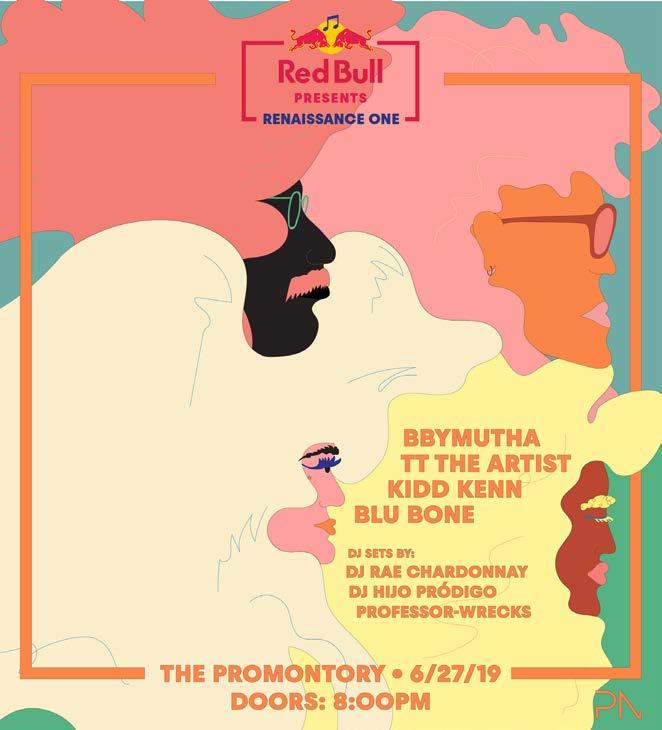





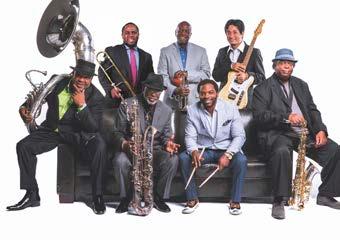




per week after they both turned 23 (they were born one day apart in June). They released the tracks in small batches of EPs on Bandcamp under the collective title Jordan Year.
“Early Jordan Year stu is bad,” Clements says. “It’s also unlistenable. We had no idea how to record. The first one, I just did alone at my dad’s house in an empty bedroom with a Dunkin’ Donuts box and a trash can—that was the drums I used, ’cause I didn’t know how to program drums even. It’s just that and a little ukulele. That’s probably a decent one—that’s how low the bar was.”
Virtue has mixed feelings too. “It was back in, like, the Odd Future days and shit, when everybody was saying fuckin’ crazy shit all the time—so I don’t really stand by it anymore,” he says. “But it was fun. It was a huge part of how I learned how to make music and craft songs quickly, and just maintain creative energy every week, no matter what happened.”
After Palace of Auburn Hills wrapped up Jordan Year in June 2015, Clements decided to remix Wilco’s “EKG” (from the July 2015 album Star Wars) and rap over it. Soundcloud blocked the song, so Clements tweeted at the band asking for their approval. Spencer Tweedy heard it first. “I was like, ‘This is really cool—this is really unexpected and totally bizarre that someone would think to rap over that song,’” he says. “We played it for my dad, and he liked it too. So we were all into the idea of inviting them over to the studio.”
Virtue and Clements visited the Wilco loft that fall. “When we get to the loft, Je ’s like, ‘Do you guys have a band?’” Clements says. “So that put it in my head, like, we should get a band and we should take this seriously.”
Palace of Auburn Hills had been a studio-only project, but the pair began to put together a live band—an experimental jazz and hip-hop group called Not Lovely. Meanwhile, Virtue began producing and recording solo tracks, accumulating several full-lengths worth of material, though he kept most of it to himself.
“Not Lovely, when it first happened, was a nine-piece band,” Virtue says. “You would have to get so many people together to create anything. I have a pretty fidgety creative bone in my body, so I would just keep making my own shit and not really have anyone to mix it properly. I didn’t really know what I was doing with mixing. The biggest reason I started putting shit out was because I met Sam.”
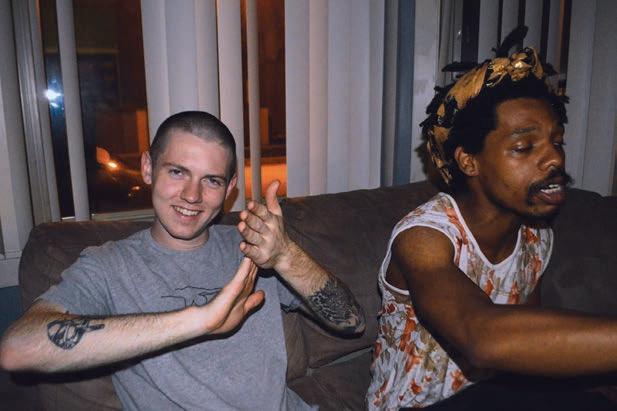
Sgroup called Santomo. After graduating high school in 2016 (he’s just 21 now, the youngest of the group), he moved to Chicago to study audio design and production at Columbia. He dropped out after a year and a half, and because he had no friends to collaborate with musically, he started working on solo recordings using his middle name, Dolan. “I put out like two or three mixtapes that don’t exist anymore because I took them all down,” he says.
At first, he sang on pop-focused tunes (“like some Homeshake shit”); then, inspired by Milo and Earl Sweatshirt, he started recording raps. Shortly before April 20, 2018, he dropped a mixtape called Dirty til I Hit the Dirt, and when he and his roommates threw a 4/20 party at their Lakeview apartment, Watson performed a few songs.
Virtue happened to be at the party, and he complimented Watson after his set. “I was like, ‘I’m a rapper too,’” Virtue says. “And he was like, ‘Oh, word?’ Because when you hear that shit . . . ”
Watson’s initial skepticism vanished once he looked up Virtue online and listened to “Should Have Been an Accountant,” which blames the racial inequities of an oppressive society for eroding the mental health of young black men. “I heard that song and I was floored,” Watson says. “So then I sent him a beat.” Watson tapped Virtue for vocals on a couple songs that he released in August 2018 on the final Dolan mixtape, Hell Is Here (he’s since scrubbed it from the Web).
Blackwell, 25, grew up on Stony Island in Calumet Heights, and he claims his mom used to babysit Common. He inhaled pop culture as a kid. “I played outside and shit, but I always wanted to be in front of the TV,” he says. “Always always always.” He was a voracious reader and dove into the rock, pop, hip-hop, and electronica that his older siblings recommended. Blackwell didn’t have Internet at home, but he spent his high school years at a boarding school in Wisconsin, where he read music blogs and eventually learned of Milo. Blackwell enrolled at Columbia directly after graduating high school in 2012. He and Virtue were both creative-writing majors there—though they never shared a classroom and wouldn’t meet till 2014, through their jobs at the Soupbox in Lakeview. They did get to know a mutual friend at school, though: Malaya Harris, who fronts Side Action. “If someone was a good writer, I just wanted to be friends with them,” she says. “I really had a lot of respect for Alex and Davis’s writing.”
am Keefe, aka Ruby Watson, grew up in Kansas City, Missouri. He played guitar and sang in a punk band that lasted all of three shows and drummed for an indie-rock
A month or so before Hell Is Here came out, Watson and Virtue knew they were onto something. “We were like, ‘We should make an EP,’” Virtue says. “And then we kept making songs.”
Their first track as Free Snacks, “Probly,” earned the approval of a collaborator whose feedback they both valued: Davis Blackwell.
Harris, Blackwell, and Virtue all had their work published in Hair Trigger, where Harris as well as Blackwell worked as editors before they graduated in 2017 (Virtue graduated in 2016). In college, Harris lived in a Logan Square punk house that occasionally hosted informal readings, some of which featured Blackwell and Virtue. During this time, she says, they also helped her through what she describes as an abusive relationship. “Both of them just have the kindest hearts, and are just the most welcoming people and extremely understanding,” Harris says. For the past two years the three of them have lived together with another friend in Bridgeport.
Even before they become roommates, Virtue had started encouraging Blackwell to get on the mike, though it took a couple years for continued from 30
Blackwell to talk himself into it. “It was a confidence thing,” he says. “I feel like it wasn’t my medium—I mean, obviously that’s not the case now, ’cause I got muthafuckin’ bars.”
In June 2018, when he started rapping, Blackwell immediately paired up with Virtue as Udababy. Whereas Virtue and Watson knocked out their tracks as Free Snacks in a couple months, Udababy took their time. “I was still just figuring out who the fuck I was as an MC,” Blackwell says. “That first song will never be released. That was trash.”
“You still write slow,” Watson says. “But back then, you wrote so slow.”
“I wrote slow as shit back then,” Blackwell says. “Now I feel I’ve got into some groove.”
“Hip-hop seemed inevitable,” Virtue says. “It wasn’t a thing that I felt like I had to push myself to do; it was something that I wanted to do all the time. I haven’t stopped doing it.” And he’s found kindred spirits in Watson, Blackwell, and Atkinson. “They have the same work ethic as me and the same standard for the quality of the sound that we make, and making something that’s equally accessible and completely unique,” Virtue says.
The four of them do share a few traits. Their raps tend to be loquacious but vulnerable, and they prefer instrumentals whose sharp hooks feel ever so slightly askew. They also love using samples. “It makes you black out—sampling is the only kind of thing that makes me do that,” Atkinson says. “I hear ancestors and shit talk to me.”
Despite his devotion to sampling, Atkinson made Papaya! with synths and field recordings instead—he’d originally wanted to release it through another label, which had issues with his use of samples. But then he learned that label had filled its schedule for the year, so he decided to go with Why? Records, which put out the album in May. The label had launched just before the March release of Virtue’s Post Faith Dialogues , and Free Snacks’ Eat Good Tape and the Udababy EP (from December and January, respectively) were retroactively added to its catalog. Watson’s album Balance from April brings the total to five.
Virtue describes the label as “an insulated cell.” The four owners pool their money to cover its low overhead expenses—a few releases have cassette versions, but their catalog is mostly in digital form on Bandcamp. The rappers record at their own home studios, using closets as vocals booths (on Bandcamp the credits of the Udababy EP say “Recorded in a Fucking Closet”). They’ve also had pro bono help from friends.
Frances Farlee, a friend of Watson’s who interns for Sooper Records, provided the Why? team with advice on how to launch their label and continues to o er them tips about promoting their music—the rappers jokingly refer to her as their manager. Watson’s roommate, Miles Hogerty, made the label’s logo and the Eat Good Tape album art. Harris, who’s also a popular makeup artist, painted Virtue’s face with a parody of the Sistine Chapel ceiling for the cover of Post Faith Dialogues, a process he says took nine hours.
Talk with any of the Why? rappers about the local scene, and they’ll immediately shout out somebody who’s given them guidance, helped them book shows, or championed their music: rapper-singer Rich Jones, Not Normal Tapes founder Ralph Rivera, Sex No Babies front man Rahim Salaam.
Watson, Virtue, Atkinson, and Blackwell have had enough success in enough di erent sectors of Chicago’s DIY scene that aboveground venues have started to take notice. When Philadelphia duo 700 Bliss played the Hideout in May, Atkinson opened, and a couple weeks later he asked Hideout talent buyer Sullivan Davis about a Why? Records showcase. “This feels like the youngest, freshest crossover group,” Davis says. “These kids are performing on these really varied bills. They’re not just performing with other hip-hop acts; they’re performing all over the place. It’s definitely approachable for a venue that doesn’t book a lot of hip-hop.”
It doesn’t hurt that the Why? crew makes such endearingly strange and idiosyncratic hip-hop. Even when they rap about mundane subjects, they make it seem like they’re the first to do it. Their best work feels private, almost secretive, perhaps because of how much of themselves they put into it. “I can be as vulnerable as I want to be, I can talk about any aspect of myself—I’m queer, so I can talk about that, I can talk about feeling small or feeling insecure, and I can do that through rap music,”
Virtue says. “I’ve always been a very spiritual person, so a lot of that shines through in my art. The only time I’m really totally sure what I’m doing spiritually is when I’m creating art.”
Free Snacks plan on another release before the end of the year, after Blackwell’s solo debut—and that’s just what they’re willing to commit to on the record. After our interview at Watson’s Ukrainian Village apartment, everyone sticks around to work on a four-way collaborative track they hope to drop before the Hideout show. Something tells me they aren’t stopping at just one song. v
@imLeor
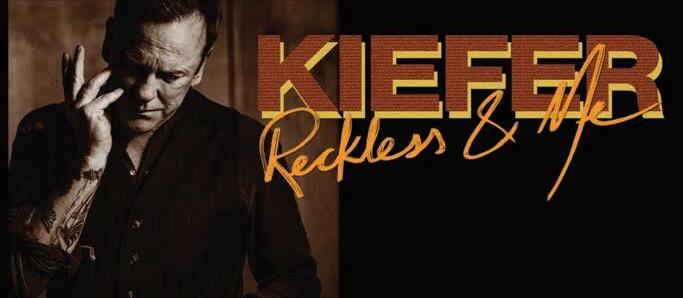

Friday, August 9 Riviera






KAREN HAWKINS
Reader coeditor in chief
Jamila Woods, “LSD” It is both possible and necessary to be obsessed with more than one Jamila Woods album at a time, and I’m doing my part by keeping both Legacy! Legacy! (2019) and Heavn (2016) on repeat. I appreciate the way “LSD” (from Heavn ) doubles as a love letter to Chicago, and this line always hits me like a lightning strike: “You gotta love me like I love the lake.” Preach. If you grew up in Chicago, the song’s video is a four-minute snapshot of your childhood summers.
Beyoncé dance captain Ashley Everett teaching the choreography for “Formation” in Chicago Back in my day, when you wanted to dance along to your favorite video, you had to hope it stayed in MTV’s countdown long enough for you to learn when to hit record on your VHS tape, then rewatch it like a maniac so you could memorize every move. You kids today have it easy. There’s a one-minute snippet of this tutorial online, and it’s my fave when I need a quick hit of dance-in-my-livingroom Beyoncé—it’s taken from a 16- minute video of a master class at Hubbard Street Dance.
Lizzo, Cuz I Love You and Coconut Oil “Make all three of them Lizzo,” enthused Reader colleague and fellow Lizzo stan Brianna Wellen when I was brainstorming for my In Rotation entries. It’s tempting, because there are days when Lizzo’s bouncy anthems are all I listen to. You heard it here first: students in first-aid classes will someday be taught to administer CPR to the beat of “Truth Hurts.”
Reader staffer shares three musical obsessions, then asks someone (who asks someone else) to take a turn.
SUSAN WERNER The wittiest singer-songwriter in Chicago
James Booker Dr. John described him as “the best Black, gay, one-eyed junkie piano genius New Orleans has ever produced.” And though I did get to see Dr. John at the Beverly Arts Center a few years ago, I regret that I’ll never see James Booker live in person. Legend has it he taught Harry Connick Jr. everything Harry Connick Jr. knows about how to play the piano.

Molly Tuttle I just discovered this young Nashville-based bluegrass singer, guitarist, and banjo player via some friends down there, and wow can she play—plus she’s such a terrific songwriter. It’ll be fun to watch Molly conquer the world—because she will.
“The Gun Song,” from Stephen Sondheim’s 1990 musical Assassins Why this piece is in my head lately, I’m not sure. But nothing can outdo Sondheim’s brilliant, creepy little barber shop quartet in capturing the weird and violent appeal of firearms. Timeless. Characters in order of appearance: Leon Czolgosz, who assassinated President William McKinley; John Wilkes Booth, who killed Lincoln; Charles Guiteau, who shot James Garfield; and Sara Jane Moore, who tried to assassinate Gerald Ford.
Musician and artist
The Stooges, Raw Power The Stooges’ Raw Power is such a great record—I’m sorry, collection of songs. You don’t have to be on anything to feel the lyrics, the percussive piano, the guitars, the drums. It’s lusty music that bangs around your head in a way I don’t hear today. Probably because Iggy Pop is 72 and there isn’t anyone else like him, though that can’t be the only reason. Maybe rock ’n’ roll has melted.
Susan Werner An artist can tour and do well and you still won’t be allowed to hear them on the aggregator that pumps music into the hair salon I’ve infiltrated for 25 years. I should be listening to Susan Werner when I’m working, but I have to search for her—I have to already know about her. Not like Sam Smith or Adele, no—they’re given to you, enforced even. Today’s algorithm seems to be beats per minute meets paid-for hype, yet it doesn’t spit out anyone I’d want to see for an hour at City Winery. Susan Werner, though—I never want her shows to end.
Housecleaning music I remember my neighbor in Logan Square used to blast L7’s “Shitlist” every time she vacuumed her apartment. Sigh. Me, I need Can or Lou Reed or Fela Kuti when I’m cleaning house. My ass has to move, my hair has to flip. I want a comedown, then a back up again. Music to me is like coffee and pot: I want the flower and the power, and I need them to be varied in flavor. Pop music doesn’t have the organic variation it used to. I don’t know who anyone is anymore—they all sound so pitch modified.

PICK OF THE WEEK

ESSO, KALETA WITH SUPER YAMBA BAND, RADIO FREE HONDURAS Fri 6/28, 9:30 PM, Sleeping Village, 3734 W. Belmont, $15. 21+
KALETA WITH SUPER YAMBA BAND AT THE LOGAN SQUARE ARTS FESTIVAL Sat 6/29, 8 PM (gates at noon), near the Illinois Centennial Monument on Logan Square, Milwaukee at Logan, $5. b
LEON “KALETA” LIGAN-MAJEK came into his talents in the early 80s—at exactly the right time to bridge two disparate genres of Nigerian music. Kaleta’s family relocated to Lagos from his native Benin during his adolescence, and after playing guitar and singing in church he began performing professionally throughout Nigeria. While he was still a young man, juju star King Sunny Adé invited him to join his touring group, where he played for about three years in the late 80s. Kaleta subsequently spent much of the 90s in Egypt 80, the legendary band of Afrobeat master Fela Kuti, though the upbeat positivity of Adé’s sweet juju melodies might seem to lie at the opposite end of the emotional spectrum from the darker, more world-weary songs of the pointedly political Fela. Kaleta’s presence as a front man is powerful, and he manages to combine
the gut-punching growls that punctuated Fela’s stage work with Adé’s warmth and charm, so that he maintains a forceful, energetic command of the band and the audience while radiating cheer. In 2017 Kaleta began collaborating with Brooklyn-based Super Yamba Band, and it’s proved to be a fantastic pairing. Kaleta knows how to get a song moving and draw bodies to the dance floor; the band’s 2018 single “Mr. Diva” (its B side is the insightfully named “Hungry Man, Angry Man”), begins with a James Brown-via-Fela grunt from the belly and quickly settles into a hip-moving groove. This fall the group will release their first album, which will include “Mr. Diva” and several new songs. If the crowd ain’t dancing, this brand of Afrobeat ain’t working, and Super Yamba Band is lucky to have an ambassador of juju at its helm. —SALEM COLLO-JULIN
Thomas Comerford Marydee Reynolds opens. 9 PM, Hungry Brain, 2319 W. Belmont. 21+ F
Singer, songwriter, and filmmaker Thomas Comerford is all about the fundamentals. To teach his cinematography students at the School of the Art Institute about lighting, he has them re-create images from their favorite movies—you can see some of their picks, drawn from the history of monster movies, in the video to Comerford’s song “Lord of the Flies.” That song, which kicks off his latest LP, Blood Moon , shows how his core influences come into play: it combines a stark, pithy guitar lead that’s close kin to the one on the Go-Betweens’ “Part Company” with soulful backing vocals reminiscent of those on Van Morrison’s Saint Dominic’s Preview . But while those antecedents make the music go down easy, it’s the mystery at the heart of the song that proves Comerford’s mettle as a writer. Even though each line delivers a lucid image, it’s the unanswered question of whether the narrator is alive, dead, or somewhere in between that keeps me coming back. The personnel on Blood Moon vary from track to track, the better to suit each song, but to support the album Comerford has assembled a band of new associates—drummer Eric Sowa, singer Crystal Hartford, and guitarist-bassist Kip Rainey. —BILL MEYER
Flipper With David Yow and Rachel Thoele Porcupine, Ganser, and Hotlips Messiah open. 8 PM, Reggies’ Rock Club, 2105 S. State, $20. 17+
We live in a time when the unhinged, nothing-tolose noise-rock front man is a punk-rock celebrity. But without Will Shatter and Bruce Loose of Flipper, the world never would’ve experienced the antics of Pissed Jeans’ Matt Korvette, These Arms Are Snakes’ Steve Snere, or Metz’s Alex Edkins. Formed in San Francisco in 1979, Flipper were born of the same west-coast hardcore scene that produced Black Flag and the Circle Jerks, but rather than leaning into rage and aggression like many of their peers, they wrote weird, disturbing, slippery, sludgy noise punk. On their first two records, 1982’s Album: Generic Flipper and 1984’s Gone Fishin’ , Shatter and Loose trade off wild vocal performances backed by the plodding grooves of drummer Steve DePace and pushed over the edge by the pure harsh-noise guitar squall of Ted Falconi. Bizarre tape effects and atonal saxophone squonk just add to the greasy, unsettling energy. Flipper called it a day in 1987, after Loose died of a drug overdose, but they’ve reappeared a handful of times with some rather impressive fill-ins: in 2009 they recorded their fourth studio album, Love, with Nirvana’s Krist Novoselic on bass (they released the live album Fight with him that same year), and on this tour they’ll be fronted by the greatest out-ofhis-mind noise-rock front man of all time, David Yow. His two most famous bands, the Jesus Lizard and Scratch Acid, simply wouldn’t have existed the same way without Flipper’s influence. —LUCA CIMARUSTI

continued from 35
Kaleta with Super Yamba Band See Pick of the Week, page 35. See also Saturday. Esso headlines; Kaleta with Super Yamba Band and Radio Free Honduras (see Gossip Wolf, page 40) open. 9:30 PM, Sleeping Village, 3734 W. Belmont, $15. 21+
Kaleta with Super Yamba Band See pick of the Week, page 35. Part of the Logan Square Arts Festival. Froth, No Men, Mykele Deville, Sweet Crude, Versing, A Flor de Piel, and the Intonation All-Stars open. 8 PM (gates at noon), near the Illinois Centennial Monument on Logan Square, Milwaukee at Logan, $5. b
Lyrical Lemonade Summer Smash See also Sunday. Day one’s lineup features Playboi Carti, Lil Yachty, A Boogie Wit da Hoodie, Ski Mask the Slump God, Blueface, Lil Mosey, Smokepurpp, City Girls, Cam’ron, Taco (DJ set), Megan Thee Stallion, Nle Choppa, Polo G, Members Only, Xavier Wulf, Maxo Kream, Warhol.SS, Tommy Genesis, Jack Harlow, Cool Kids, Landon Cube, Queen Key, Supa Bwe, Jasiah, Lil Tecca, and Femdot. Noon, Douglas Park, 1401 S. Sacramento, $189 for 2-day pass. b
The Summer Smash, presented by Chicago hip-hop blog turned cultural powerhouse Lyrical Lemonade, is already the biggest rap festival in the city— and it’s on track to be one of the biggest in the country. After debuting in August 2018 as a oneday event with two stages, the Summer Smash has expanded to two days, with three stages and 51 acts. If anything demonstrates how important Lyrical Lemonade has become in hip-hop, it’s that histrionic young rapper Juice Wrld—who’s had albums debut at number one and number two on the Billboard 200 in the past eight months—is headlining the Summer Smash and not Lollapalooza. The site and its festival have become synonymous with “Soundcloud rap,” partly because Lyrical Lemonade founder Cole Bennett has directed videos by some of the best-known MCs in that ill-defined scene. The Summer Smash bill is stacked with rappers who’ve worked with Bennett, including flamboyant Florida wordsmith Ski Mask the Slump God, Seattle crooner Lil Mosey, and mischievous LA personality Blueface. You could also see the bill as a fascinating cross section of current rap, represented by some of its most notable success stories—among them Charlotte spitter DaBaby, ferocious Houston rapper Megan Thee Stallion, and New York crossover darling A Boogie Wit da Hoodie (whose recent Hoodie Szn became the lowest-selling album to hit number one). Among those rising stars is Chicago’s Taurus Bartlett, better known as Polo G. Raised in Old Town’s Marshall Field Garden Apartments project, he’s leading a new wave of local rappers who’ve adapted drill’s hard-edged aesthetics to melodic, pop-forward songs. The gravitas and raw emotion in his performances—including the breakout “Finer Things” and the smash “Pop Out”—make his recent

debut, Die a Legend (Columbia), a lock for one of the year’s best albums. Polo G is part of a small army of great locals on the Summer Smash bill, including the Cool Kids, Supa Bwe, Queen Key, and Femdot. Unfortunately, the fest also features Florida rapper Kodak Black, who’s awaiting trial on allegations of sexual battery in South Carolina and was arrested last month in Florida on weapons charges. You can’t buy a ticket without supporting him, but what you can do is save your attention for the sets by noncreeps.
—LEOR GALIL
Malina Moye Mzz. Reese opens. 9:30 PM, Buddy Guy’s Legends, 700 S. Wabash, $20. 21+
Malina Moye first picked up the guitar at age nine, and at 12 she became the lead singer of her family’s R&B band, joining her parents and brothers onstage. By the mid-aughts, Moye had gone solo, establishing herself as a versatile artist who can move among or blend together blues, funk, rock, and pop. Moye’s guitar playing took center stage on her 2014 album, Rock & Roll Baby, which includes a collaboration with Bootsy Collins (“K-Yotic”) and a cover she calls “Foxey Lady,” which tweaks the riffs and lyrics of a favorite by fellow left-handed upside-down guitarist Jimi Hendrix. But on her latest full-length, last year’s Bad as I Wanna Be , she steers the focus to her songwriting, using a lighter hand with guitar solos and lead parts—they just enhance the dynamics as she goes along. The album hit number one on the Billboard blues chart, but given that elements of funk, R&B, gospel, pop, and more flit in and out of its tracks, it’s almost strange to see it there; opener “Something 2 Say” trades in stomping, funky blues-rock, “Jumpin’” recalls the R&B-tinged synth-pop numbers that lit up the charts in the 80s, and “Woman 2 Woman” is a rootsy, stripped-down ballad with a soulful chorus of backup singers. Moye’s upbeat persona and empowering lyrics provide a unifying thread and create a spirit that she passes along to others onstage and off; in 2016 she teamed up with screenwriter Marc Fusco to found the Drive Hope Foundation, a nonprofit that encourages disadvantaged teens to pursue their dream careers. —JAMIE LUDWIG
Find more music listings at chicagoreader.com/soundboard
Pelican Young Widows and Cloakroom open. 8 PM, Metro, 3730 N. Clark, $18. 18+
Chicago (mostly) instrumental progressive- metal favorites Pelican produced full-lengths on a fairly regular schedule throughout the 00s, but that reliability began to break down when the decade flipped to the 10s. Four years passed between What We All Come to Need and Forever Becoming , the first album with Dallas Thomas of the Swan King stepping in for original guitarist Laurent SchroederLebec. It’s taken Pelican another six years to release their brand-new Nighttime Stories, but listening to it and learning some of the history behind it provide perspective on the delay. The name of the album and the titles of its songs come from Jody Minnoch, a longtime friend and collaborator (he formed Tusk in 1998 with three future members of Pelican) who passed away in 2014. And as the band was in the midst of writing the record, using Minnoch’s notes as inspiration, Thomas lost his father. Pelican’s greatest talent has always been their ability to convey an enormous range of emotions using highly technical music without relying on the relatively easy connection enabled by vocals, and the sad backstory of Nighttime Stories lends even greater depth to its painterly soundscapes. One of the album’s heaviest songs, “Cold Hope,” has relatively little flash—just serpentine circling rhythm, weight, and power. On the title track, guitar lines whip about like trees in a high wind or keen like mourners at the kind of funeral where grief doesn’t have to be staid and polite. Nighttime Stories is a powerful comeback that will reward deeper listens over the years.
—MONICA KENDRICK
Chicago Mariachi Festival Aida Cuevas headlines, Mariachi Herencia de Mexico, Mariachi Juvenil Tecalitlan, and Mariachi Aztlan open. 4 PM, Pritzker Pavilion at Millennium Park, 201 E. Randolph. b F
There’s no other music as unapologetically Mexican as mariachi music. Designated an Intangible Cultural Heritage of Humanity by UNESCO in 2011, the genre has succeeded through the centuries and across borders—a shining example of its power, particularly in times of conflict. In the United States, mariachi’s history as a sign of resistance and cultural pride stretches back at least to the dawn of the Chicano movement in the 1960s. In Chicago and other U.S. cities, mariachi music is undergoing a revival as
an indispensable representation of Mexican American identity. The Chicago Mariachi Festival, the largest such event in the country, is a prime example of that resurgence. It attracts more than 22,000 music lovers every year—a crowd so vast that in 2015 Lady Gaga confused it with a Pride gathering. For its fifth edition, the Mariachi Festival has booked Grammy- and Latin Grammy-winning traditional Mexican singer Aida Cuevas as well as Chicago’s own Mariachi Herencia de Mexico. Founded by the Mariachi Heritage Foundation (a cosponsor of the fest), Mariachi Herencia de Mexico is an ensemble of 11- to 19-year-old musicians from Chicago’s immigrant barrios. The group earned a Latin Grammy nomination for Best Ranchero/Mariachi Album with their debut, 2017’s Nuestra Herencia, and last year their follow-up, Herencia de la Tierra Mía, hit number two on Billboard ’s Latin Albums chart. Their third album, Esencia , comes out two days before the festival. Mariachi is a big, bold form of music, designed to inspire strong, direct emotions: joy, pride, sadness, tenderness, courage, rebelliousness. And if that’s not enough to make this fest a soul-stirring experience, many of the bands will be accompanied by dance ensembles whose beautiful colors and movements will spread out and flow under the Pritzker Pavilion’s silver wings. —CATALINA MARIA JOHNSON
Harry & the Potters Richard Album & the Singles open. 7 PM, Beat Kitchen, 2100 W. Belmont, $14. b
Even the most hard-core Harry Potter fans can suffer from wizard fatigue these days. What started as a seven-book series has exploded into theme parks, spin-off movies, and a flood of ill-advised J.K. Rowling tweets. (Please, someone, change her password.) But just when all seems lost, wizard-rock band Harry & the Potters return to save the day with Lumos , their first album in 13 years. The core members of this Massachusetts group are roundglasses-and-Gryffindor-tie-sporting brothers Paul and Joe DeGeorge. Since their inauspicious start playing for six people in their family’s backyard in 2002, Harry & the Potters have released four studio albums, toured all over the world (often playing punk houses and public libraries), and built a dedicated cult following comprising DIY kids and wand-toting nerds who enjoy sing-alongs about basilisks, first kisses, and defeating the Dark Lord. Lumos follows the plot of Deathly Hallows, the final book in the series, and mixes in sounds such as funky saxophone (“Hermione’s Army”) and honkytonk twang (“Gone Campin’”). Kimya Dawson

J
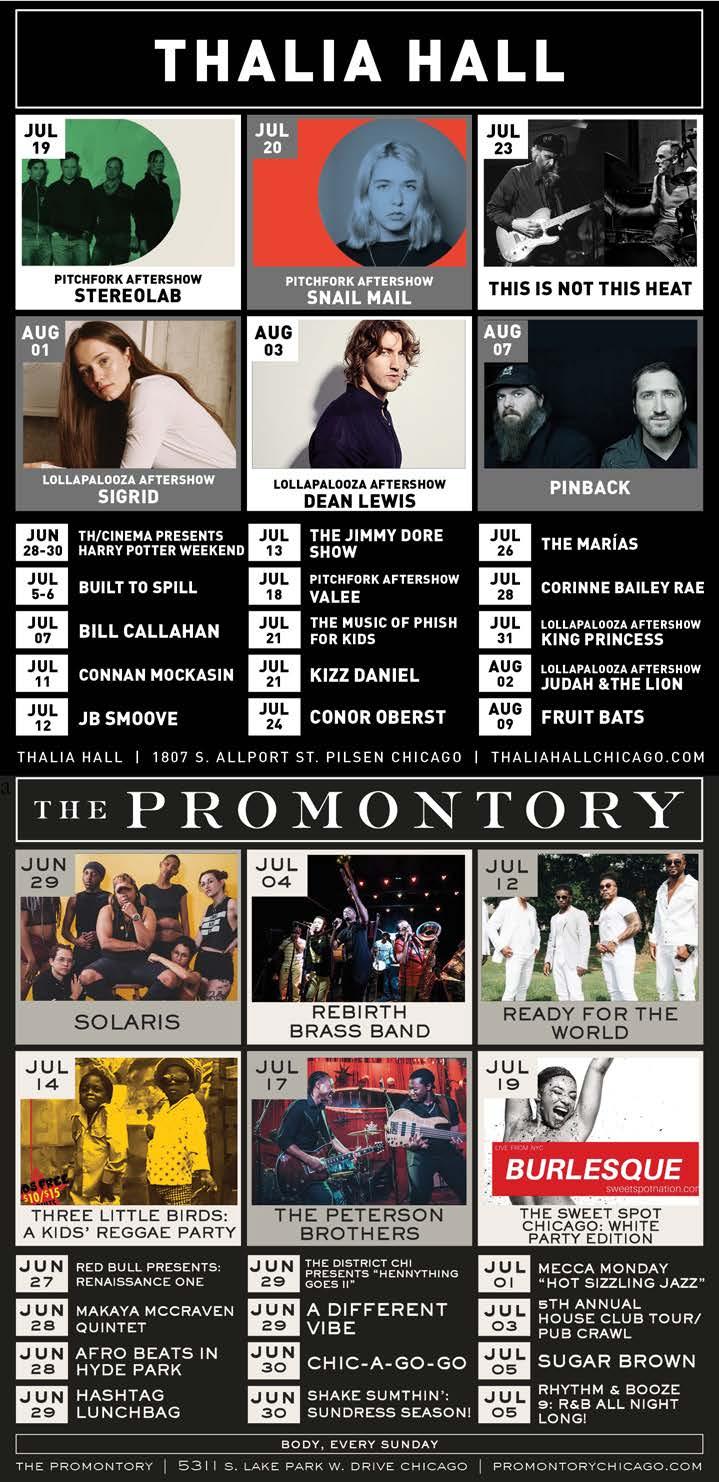
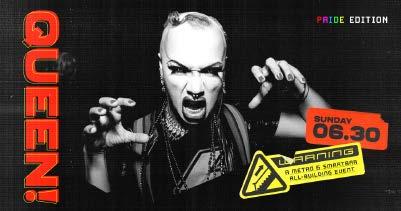



makes a cameo as Hermione alongside Paul’s Harry Potter in the duet “Where’s Ron?,” whose video features characters from viral mid-aughts webseries The Potter Puppet Pals . Like the group’s previous albums, Lumos illuminates the power of earnest enjoyment and the sweet but goofy seriousness of caring very deeply about a bunch of teenage witches and wizards. So raise your lighters and your wands: in 2019, Harry & the Potters might be the best thing about Harry Potter fandom. —MEGAN
KIRBY
Lyrical Lemonade Summer Smash See Saturday. Day two’s lineup features Juice Wrld, Kodak Black, Tyga, Carnage, Trippie Redd, Aminé, DaBaby, Shoreline Mafia, Comethazine, Yung Bans, Currensy, Lil Tjay, Earthgang, Lil Keed, Lil Gotit, Tay Money, IDK, Germ, Cdot Honcho, Yung Baby Tate, Slime Dollaz, Ngeeyl, Buru, Ronsocold, Bennett, and DJ Scheme. Noon, Douglas Park, 1401 S. Sacramento, $189 for a twoday pass. b
Psalm one Part of the Back Lot Bash, which runs Sat 6/29 and Sun 6/30. Jackie Cruz headlines; Catfight, Dorian Electra, Psalm One, DJ All the Way Kay, and Gemini Jones open. 4 PM, parking lot near 5238 N. Clark, $20. 21+
Cristalle Bowen, best known as Psalm One, has a creative stamina and drive matched by few Chicago rappers. She began carving out a career as a solo artist in the early 2000s, and it became her main focus after her promising underground crew the Nacrobats broke up in 2003. And aside from a brief stint with Minneapolis hip-hop imprint Rhymesayers in the mid-2000s, she’s largely done it without label support—she’s self-released her records and put together her own tours. In 2013 she created a new stage persona, Hologram Kizzie, and the following year she launched the Rapper Chicks, her first collective since the Nacrobats. A few years ago, Rapper Chicks rapper-singer Angel Davanport moved to Minneapolis, and Psalm followed suit, partly to help with Angel’s music and partly to refocus her own creative energy. The change appears to have worked, at least judging from the sound of Psalm’s new Flight of the Wig (Rapper Chicks). She’s a keen writer and a vigorous rapper, and her visceral per-
Find more music listings at chicagoreader.com/soundboard
formances on the album give an extra bite to her lyrical attacks on homophobia and misogyny. My favorite tracks showcase her might on the mike: on “I Got Time (Incomplete),” for instance, the minimalist instrumental feels almost sleepy, anchored by a somber piano melody, but Psalm twists her verses around the beat with such inventiveness that the track leaps to life.
—LEOR GALIL
Curls Spirits Having Fun, the Hecks, and Sewingneedle open. 8:30 PM, Empty Bottle, 1035 N. Western. 21+ F
Bless the weirdos in the Curls. Beginning about six years back, the local experimental indie-pop outfit figured out their sound at DIY spaces, most notably Young Camelot—but their ambitious, expansive new album, Bounce House (Diversion), makes that incubation period feel like a lifetime ago. The sixpiece group meld funk, indie rock, synth-pop, doowop, and various fringier styles into a brazen style that’s almost too eclectic for its own good. More o en than not, though, it works: I never realized I wanted to hear a band mix glimmering Prince funk with jittery Dirty Projectors indie rock, but “Bad Boi” makes me wish the Curls would do it again. While most of Bounce House is loud and absurd, the best track is low-key and tender: the boogie-flavored synth on “Isn’t It Funny” is an invitation to a mellow time on the nearest dance floor.
—LEOR GALIL
FitzGerald’s 38th American Music Festival Runs through Sat 7/6. Day one features the Waco Brothers, Commonheart, Chicago Farmer, Sunny War, Coyote Riot, JD McPherson, Sarah Shook & the Disarmers, Robbie Fulks & Redd Volkaert, the Salty Dogs, Alewife, the Fox Crossing String Band, the Joel Paterson Organ Trio, Cannonball, and Bunkertown. 4:30 PM, FitzGerald’s, 6615 Roosevelt Rd., Berwyn, $50. 21+
Every year since 1981, FitzGerald’s American Music Festival has celebrated the Fourth of July with a

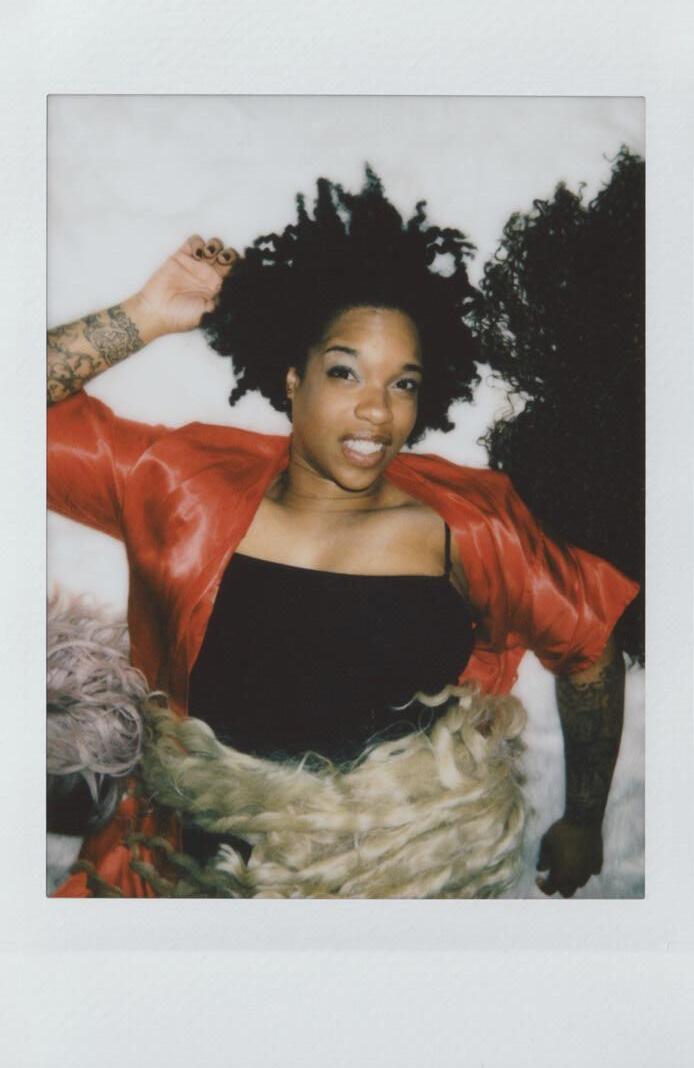
great lineup of roots music, and the 38th edition is no exception: it has plenty of highlights on its four days on three stages (the club, the smaller SideBar, and a tent outside). Chicagoan Robbie Fulks rolls in with country guitar wizard Redd Volkaert (July 3, 6:30 PM, tent), who joined Merle Haggard’s band in
1997 as a successor to the great Roy Nichols. Any aficionado of country guitar can tell you that those are some king-size shoes to fill, but Volkaert (who’s made excellent solo albums for Hightone and other labels) stepped into them like he was born to do it.
NRBQ (July 4, 6:30 PM, tent) have been local favorites for so long that they now have two Chicago musicians in their lineup, bassist Casey McDonough and guitarist Scott Ligon. And it’s always good to hear from North Carolina-bred, New Orleans-based singer Nikki Hill (July 4, 9:30 PM, club), who performs for the second summer in a row; imagine a cross between R&B hall of famer LaVern Baker and rockabilly queen Wanda Jackson and you’ll have a good idea where she’s coming from. Drummer and singer-songwriter Lindsay Beaver (July 6, 1:30 PM, tent), born in Nova Scotia and based in Austin, Texas, made her Alligator Records debut last year with Tough as Love, which alternates between driving blues and up-tempo rockabilly. Other locals on the bill include guitarist Jimmy Burns, with his evenhanded take on the blues (July 6, 6 PM, SideBar), and Peter Joly (July 4, 4 PM, SideBar) and Pie Eyed Pete & the New Dealers (July 6, 10 PM, SideBar), who both make interesting down-tempo folk. With its decades of bookings, the American Music Festival has made regulars of a number of wonderful artists, and I’m especially glad to see return visits by familiar faces Alejandro Escovedo, Marcia Ball, the Iguanas, Jon Dee Graham, Brave Combo, and Terrance Simien. —JAMES PORTER v













SALE: 8/7:
8/8: THROWAWAY, 8/19: BLACK TAFFY, 8/25:

070 Shake 10/2, 8 PM, Bottom Lounge, on sale Fri 6/28, noon, 17+
Abhi the Nomad, Dave B 10/30, 7:30 PM, Schubas, on sale Fri 6/28, 10 AM b
Acemo, Ariel Zetina b2b Morenxxx, Miss Twink USA 7/26, 10 PM, Smart Bar Ali Barter 11/13, 7:30 PM, Schubas, on sale Fri 6/28, 9 AM, 18+ Bad Suns, Russo 8/2, 10 PM, Reggies’ Rock Club, 17+ Birdhouse in Your Soul with Pet Symmetry, Outdoor Velour 7/26, 8 PM, GMan Tavern Black Flag 8/25, 11 PM, Reggies’ Rock Club, 18+
Blanck Mass, Helm 9/26, 8:30 PM, Empty Bottle, on sale Fri 6/28, 10 AM
Boy Jr., Natalie Grace Alford, Ava Lake 7/19, 7:30 PM, GMan Tavern
Ronnie Baker Brooks 9/20, 8 PM, City Winery, on sale Fri 6/28, noon b
Dave Brubeck Tribute Project 8/28, 7:30 PM, SPACE, Evanston, on sale Fri 6/28, 10 AM b Burr Oak, Hanna Ashbrook, Sick Day, Caroline Campbell 7/23, 8 PM, Schubas F Tim Cappello 7/24, 8 PM, GMan Tavern F Captain UFO, Violet Suns, Lathes 7/11, 8:30 PM, Hideout Slaid Cleaves 10/17, 8 PM, FitzGerald’s, Berwyn, on sale Fri 6/28, 11 AM
Roger Clyne 9/23, 8 PM, City Winery b Shemekia Copeland 10/11, 8 PM, SPACE, Evanston, on sale Fri 6/28, 10 AM b Elvis Costello & the Imposters
11/22, 8 PM, Chicago Theatre, on sale Fri 7/12, 10 AM b Marshall Crenshaw 12/12, 8 PM, SPACE, Evanston, on sale Fri 6/28, 10 AM b Cross Record 9/17, 8 PM, Schubas, 18+ Current Swell 11/26, 8 PM, Schubas, 18+
Doso, Franchika, Frsh Waters, DJ Cash Era 8/8, 7:30 PM, Schubas b Drahla 10/2, 8:30 PM, Empty Bottle, on sale Fri 6/28, 10 AM Enter Shikari, Can't Swim 10/7, 7 PM, Lincoln Hall b Field 8/25, 8:30 PM, Empty Bottle
Freestyle Forever: Mixtape Edition 2 with Rochelle, Laura, Mellow Man Ace, David of Nice & Wild, Troy Guy of D'yzre, Boriqua Posse, Bobby D 10/11, 8 PM, Concord Music Hall, 17+ Green Velvet, Dajae 7/27, 9 PM, Concord Music Hall, 18+ Griz 10/5, 5 PM, Navy Pier, 18+ Grupo Cañaveral 9/27, 10 PM, Joe’s Live, Rosemont Noah Gundersen, Henry Jamison 10/4, 9 PM, Lincoln Hall, on sale Fri 6/28, 10 AM, 18+ Joe Hertler & the Rainbow Seekers 9/5, 9 PM, Lincoln Hall, on sale Fri 6/28, 10 AM, 18+ Hesh, Al Ross, Brute b2b Gapz, Blvckmvgic 9/12, 8:30 PM, Park West, 18+ Hiromi 10/14, 8 PM; 10/15, 8 PM, City Winery, on sale Fri 6/28, noon b Brittany Howard of Alabama Shakes 9/20, 7:30 PM, Riviera Theatre, on sale Fri 6/28, 10 AM, 18+
H.R., Downtown Brown, Top Shelf Lickers 7/12, 7:30 PM, Reggies’ Music Joint Jennifer Hudson with the Chicago Symphony Orchestra
Bea Miller 11/8, 7 PM, Metro, on sale Fri 6/28, 10 AM b Morrissey, Interpol 9/14, 7 PM, Ravinia Festival, Highland Park b Motet, Exmag 12/14, 9 PM, the Vic, on sale Fri 6/28, 10 AM, 18+
Moxie, Sevron, and more 7/27, 10 PM, Smart Bar Mystical Arts of Tibet with singers of Drepung Loseling Monastery 9/28, 8 PM, Fermilab, Ramsey Auditorium, Batavia b Adam Ness, Sa'rayah, Luke Titus 7/21, 8 PM, Schubas, 18+ New Pornographers, Lady Lamb 10/2, 7:30 PM, the Vic, on sale Fri 6/28, 10 AM, 18+ Night King dance party with DJ Alex Acosta, DJ Alex Cabot 8/9, 11 PM, Metro John Pizzarelli 10/13, 5 and 8 PM, SPACE, Evanston, on sale Fri 6/28, 10 AM b
7/14, 6 PM, Ravinia Festival, Highland Park b Ivardensphere (live), Patrick Codenys (DJ set), Physical Wash (live), Patrixia (DJ set) 9/20, 11:59 PM, Smart Bar
Justin Peter Kinkel-Schuster, Spencer Thomas 9/9, 8 PM, SPACE, Evanston, on sale Fri 6/28, 10 AM b
La Santa Cecilia 9/22, 6:30 PM, Concord Music Hall b Pokey LaFarge 10/24, 8 PM, Maurer Hall, Old Town School of Folk Music, on sale Fri 6/28, 9 AM b
Avril Lavigne 9/26, 8 PM, Chicago Theatre, on sale Fri 6/28, 10 AM b
Leahy 9/3, 7 PM, City Winery, on sale Fri 6/28, noon b Loose Ends 9/2, 5 and 8 PM, City Winery b
Jane Lynch's Swingin' Little Christmas 12/15, 5 and 8 PM, City Winery b
Mahalia 9/23, 8 PM, Lincoln Hall, on sale Fri 6/28, 10 AM, 18+
Main Squeeze 10/25, 9 PM, Bottom Lounge, 17+
Becca Mancari, Frances Cone 9/22, 8 PM, SPACE, Evanston b
Matt Muse, Ausar, Loona Dae, DJ Cash Era 8/17, 8 PM, Schubas b Maxwell 7/9, 7:30 PM, Ravinia Festival, Highland Park b Michael McDonald & Chaka Khan, Isaiah Sharkey 7/6, 7 PM, Ravinia Festival, Highland Park b
Freddie McGregor 8/15, 8 PM, SPACE, Evanston, on sale Fri 6/28, 10 AM b
Mella Dee, Jon Orve, Sigsaly 10/25, 10 PM, Smart Bar
Vic Mensa, Jesse 9/6, 8 PM, the Vic b
Mike Mentz, Tim Stop 8/24, 8:30 PM, Schubas
Never miss a show again. Sign up for the newsletter at chicagoreader. com/early
7:30 PM, City Winery b Weird Al Yankovic 7/28, 8:30 PM, Ravinia Festival, Highland Park b Tiffany Young 11/2, 7:30 PM, the Vic b Yungblud, Missio 10/4, 7:30 PM, the Vic b Zo & Carmen Rodgers 8/8, 8 PM, City Winery b
Pop 2000 hosted by Lance Bass with O-Town, Aaron Carter, Ryan Cabrera, Tyler Hilton 7/13, 8 PM, Joe’s Live, Rosemont Quarter Mile Thunder, Peter Oren, Kelsey Wild 7/27, 9:30 PM, Hideout
Scarypoolparty (Alejandro Aranda) 10/23, 7:30 PM, the Vic, on sale Fri 6/28, 10 AM b Cosmo Sheldrake, Altopalo 10/1, 7:30 PM, Lincoln Hall, on sale Fri 6/28, 10 AM b
JD Simo 8/15, 8 PM, FitzGerald’s, Berwyn, on sale Fri 6/28, 11 AM
Skillet, Alter Bridge, Dirty Honey 10/10, 7 PM, Chicago Theatre, on sale Fri 6/28, 10 AM b
Slack with Michael Serafini, Olin b2b Leo Leal 7/13, 10 PM, Smart Bar
Son Little 11/20, 8 PM, Maurer Hall, Old Town School of Folk Music, on sale Fri 6/28, 9 AM b
Leslie Stevens 9/17, 8 PM, SPACE, Evanston b Barbra Streisand 8/6, 8 PM, United Center b Billy Strings 11/22, 8 PM, Concord Music Hall, 18+
Sur ort 8/7, 8:30 PM, Empty Bottle
Sweet Honey in the Rock 7/31, 7:30 PM, Martin Theatre, Ravinia Festival, Highland Park b
Tuck & Patti, Sam Fazio 12/1012/11, 7:30 PM, SPACE, Evanston, on sale Fri 6/28, 10 AM b Vatican Shadow, Becka Diamond, Andi Harriman 9/21, 11:59 PM, Smart Bar
Video Age 9/20, 9:30 PM, Hideout
Max Weinberg's Jukebox 8/23, 8 PM, City Winery b Ric Wilson 7/19, 11 PM, Schubas, 18+
Women of Mister Kelly's 7/29,

A furry ear to the ground of the local music scene
Lydia Ainsworth 7/8, 9 PM, Sleeping Village Altin Gun 7/29, 8 PM, Lincoln Hall, 18+ Built to Spill, Orua, Wetface 7/5-7/6, 9 PM, Thalia Hall, 17+ Bill Callahan 7/7, 8:30 PM, Thalia Hall, 17+ Combo Chimbita 7/8, 8:30 PM, Empty Bottle Converge 8/24, 7 PM, House of Vans, 18+ Davila 666, Running 7/25, 9 PM, Sleeping Village Chris Forsyth & the Broken Mirrors Motel Band 7/13, 9:30 PM, Hideout Fruit Bats 8/9, 9 PM, Thalia Hall, 17+
Glitter Moneyyy, Showyousuck, J Bambii 7/11, 8:30 PM, Empty Bottle
Great Grandpa 7/8, 8 PM, Beat Kitchen, 17+ Great Peacock 7/18, 8:30 PM, FitzGerald’s, Berwyn Immortal Bird, Warforged, Barren Heir 7/16, 8:30 PM, Empty Bottle
Iron Maiden, Raven Age 8/22, 7:30 PM, Hollywood Casino Amphitheatre, Tinley Park Carly Rae Jepsen 7/9, 8 PM, Chicago Theatre b Typhanie Monique 8/11, 7 PM, SPACE, Evanston b Morglbl, Devil's Staircase, Pavlov3 9/4, 7 PM, Reggies’ Music Joint
Chloe Moriondo 8/24, 7 PM, Subterranean b Purling Hiss, Writhing Squares 7/18, 9 PM, Hideout Purple Mountains (David Berman) 8/24-8/25, 9 PM, Sleeping Village Star Tropics, Clever Girls 7/23, 8:30 PM, Empty Bottle
Stereolab 7/19, 10:30 PM, Thalia Hall, 18+
John Waite 8/22, 8 PM, City Winery b Wavves 7/28, 9 PM, Subterranean, 17+
Chely Wright, Alice Peacock 9/11, 8 PM, City Winery b
GOSSIP WOLF WASN’T there when dazzlingly fleet-fingered guitarist and singer Charlie Baran cofounded “punta rock” group Banda Blanca in Honduras in the early 70s, so it’s hard to say if he’s even better today. Baran now lives in Chicago (he used to play in Casolando), and in 2011 his talent inspired Dan Abu-Absi from JT & the Clouds to form a band around him: Radio Free Honduras perform Baran’s tunes and well-chosen covers with a revolving-door cast of younger musicians. On Friday, June 28, Radio Free Honduras drop Mis Sueños , their first album since 2014. Lead single “Suavecito” is delightfully radio friendly, but where RFH really shine is as a live band, as anyone who’s danced up a storm at their monthly California Clipper shows can attest. Friday night they play a Logan Square Arts Festival a ershow at Sleeping Village to celebrate the new record, opening for Kaleta & Super Yamba Band and Esso. Chicago rapper Xavier Holliday is one of many great voices to emerge from the scene this decade. This week, though, he’ll cap a series he started five years ago, dropping Need to Know III: Nova —which he considers his finale. This wolf hopes Holliday’s retirement isn’t permanent: the Nova track “POV” combines lilting guitar with wrenching lyrics about structural inequality, making for one of the year’s most memorable Chicago rap songs. On Friday, June 28, Chicago archival label the Numero Group hosts an open house at its Little Village HQ. Starting at 4 PM, everything in its Factory Outlet is 20 percent off, and you can try out the forthcoming Escape From Synth City video game; the first 50 people get a free tote filled with goodies. At 5:30 PM, Numero will screen a selection of films and TV shows, and at 8:30 PM veteran yacht rocker Ned Doheny makes his Chicago debut—followed by DJ sets from Numero staff and the team at label and record reseller Paradise Is a Frequency. Plus it’s all free! —J.R. NELSON AND LEOR GALIL
Got a tip? Tweet @Gossip_Wolf or e-mail gossipwolf@chicagoreader.com.
Shy
By DAN SAVAGE
Q : I’m a single gay guy in my late 30s. I’m quite introverted and a bit shy, yet I have a big sexual drive and a rich libido. I’ve always found the gay scene overwhelming. I feel my quiet ways tend to put people off, and I hardly ever get the chance to show my more playful or crazy sides, as it takes me a bit to feel comfortable to show those. Whenever I was able to, my partners were usually pleasantly surprised and we could enjoy plenty of fun, but I can count these occasions on the fingers of one hand. I feel most guys just stop at my gentle disposition and assume I must be a bit boring if not a prude altogether. Turns out I actually have quite a few kinks—bondage being one of them—but so far I have hardly been able to explore them with a partner. Often those drawn to me haven’t really been of the sexually adventurous kind. By my looks I don’t really fit into any of the “tribes” that a lot of gay men identify with. I find myself on the outside looking in when searching for a nice guy for a date or more. How do I crack this shell of mine open?
—ALWAYS LOOKED OVER, NEVER EMBRACED
A : Next time you find yourself on the outside looking in, ALONE, take a moment to look around. Because that small scrum of guys who fit neatly into whatever gay tribe happens to be dominating the bar/ pool/whatever are usually surrounded by a much larger group of guys who don’t fit neatly into that particular
tribe. And if the guys looking longingly at the easy-andobvious tribe would look around, they’d see a whole lot of guys like them—guys who might be feeling a little awkward or out of place, guys who are attractive in perhaps less conventional or immediately apparent ways, guys with hidden depths, etc. In other words, ALONE, guys like you.
And speaking of guys like you, did you know you have a motherfucking superpower that makes you a member of all gay tribes and your own unique tribe?
“Bondage is the great unifier among kinksters,” said Joshua Boyd, a gay bondage “enthusiast,” as they say, in his mid-30s who lives and ties in the Seattle area. “Bondage guys are from all walks of life, and they range from twinks to muscle guys to bears, cubs, jocks, and average Joes.
“ALONE should put any
search for a long-term relationship on hold and look for more casual kinky fun,” said Boyd. “Recon (recon.com) has always been a good place for me to start conversations with fun guys—I even met my husband there. The bottom line is there are others who share his interests, and they are waiting to connect with him.”
But you’re shy! You’re introverted! Connecting is hard! Boyd describes himself the same way and not only is he married, ALONE, he doesn’t lack for casual play partners, and he’s got play pics all over the Internet to prove it.
Tyger Yoshi also describes himself as shy and introverted—and I recently watched shy, introverted Yoshi do a bondage demo at Trade, a gay leather bar in Denver, where he suspended a guy from the ceiling.
“When I first started exploring my interest in















continued from 41
bondage, I was lucky enough to be in a city where opportunities were plentiful, even for a shy, introverted person like me,” said Yoshi, who’s also in his mid-30s. “There were people who wanted to mentor me, but I struggled taking that first step of accepting help.”
The kind of help Yoshi is referring to can most easily be found at munches, i.e., casual meet-ups where kinky people, both queer and straight, socialize and connect with other like-minded kinksters. (Munches ≠ play parties.) Spend five seconds on Google, ALONE, and you’ll also find kinky educational organizations that offer classes for people who want to hone their bondage skills while learning about consent, safety, and other best practices. And whether you’re a bondage top (you want to tie) or a bondage bottom (you want to be tied) or a switch (tie and be tied), you’ll make friends in bondage classes. And if you wind up clicking with someone, that person isn’t going to assume you’re a prude (they met you at a bondage class) and that person will definitely be sexually adventurous (you met them at a bondage class). And unlike gay bars or clubs, a person’s skills are just as important as their looks at gay bondage parties and events.
“After you start making connections and building your circle, find local fetish/kink events that are happening around you—you may need to reach out to the pansexual community—and see if one of your new friends from the munch or the class or Recon is willing to go with you to check it out,” said Yoshi. “And as you start exploring more of your kink side, consider the possibility of separating kink and sex at first. Let people know that you are interested in bondage but haven’t tried much and you want to practice. Having an exploratory or practice session is much different than having a bondage sex session, and people may be more willing to facilitate that exploration. And from my experience, if you’re able to get up the courage to go out to a kink play party (with a friend for support), the likelihood of finding someone who’s willing to assist in new or first-time experiences increase.”
So, ALONE, that thing you’ve been holding back until you get to know someone? Your interest in bondage? Lead with that. Get involved in the kink scene, work on your skill set, be friendly and open—be the nice guy— and you’ll meet lots of men you have something in common with. Trust me, your tribe is out there. v
Send letters to mail@savagelove.net. Download the Savage Lovecast every Tuesday at savagelovecast.com. @fakedansavage
TransUnion, LLC seeks Sr. Developers for Chicago, IL location to design, implement & maintain software applications for business processes. Master’s in Comp. Sci./ Eng./Info. Systems/Info. Tech.y or any Eng. field + 2yrs exp. or Bachelor’s in Comp. Sci./Eng./Info. Systems/Info. Tech. or any Eng. field + 5yrs exp. req’d. Req’d skills: Software development exp. w/Core Java, OOPS, Multithreading, Java Concurrency, J2EE (Servlets, JSP, Struts, JDBC), Spring framework (Core, MVC, JDBC, Batch), Hibernate, SQLJ; RDBMS (DB2, Oracle), Unix/Linux, shell scripting, Autosys, CI/ CD (Maven, Jenkins), Junit, STS, RAD, WebSphere. Send resume to: R. Harvey, REF: RR, 555 W Adams, Chicago, IL 60661 (06/27)
ADMINISTRATIVE SALES & MARKETING FOOD & DRINK SPAS & SALONS BIKE JOBS GENERAL REAL ESTATE RENTALS FOR SALE NON-RESIDENTIAL ROOMATES MARKETPLACE GOODS SERVICES HEALTH & WELLNESS INSTRUCTION
MUSIC & ARTS NOTICES
MESSAGES LEGAL NOTICES ADULT SERVICES
TransUnion, LLC seeks Sr. Developers for Chicago, IL location to design & develop sw applications. Master’s in Comp. Sci./Comp. Eng./ Info. Systems/Info. Tech. + 2yrs exp. or Bachelor’s in Comp. Sci./Comp. Eng./ Info. Systems/Info. Tech. + 5yrs exp. req’d. Req’d skills: AbInitio, Query>IT, Control Center, BRE, Express>IT/ ACE development, JSON, XML, Agile, CI/CD, Oracle, Unix/Linux, shell scripting, Autosys, SQL Developer, Hadoop(Map/Reduce), Kafka, Apache Spark. 20% telecommuting permitted. Send resume to: R. Harvey, REF: VM, 555 W Adams, Chicago, IL 60661 (06/27)
TransUnion, LLC seeks Consultants for Chicago, IL location to develop sw test plans, execute all test plans, & validate batch fulfillment system setup & output data & resolve critical sw development batch issues. Master’s in Comp Sci/Comp Info Systems/ Comp Applications +2yrs exp. or Bachelor’s in Comp Sci/Comp Info Systems/ Comp Applications +5yrs exp. req’d. Skills req’d: sw development, maintenance, integration, testing & migration to new system, & using .NET framework, C#, C++, VC++, MFC, SVN; requirement gathering, automating repetitive & generic processes; leading development process improvements, understanding of complete SDLC; resolving critical sw development issues; developing POC; propose effective changes based on product interaction w/ other units; standard Open systems applications, FileZilla, SQL, Visual Studio, JavaScript, HTML, XML, SQL Server, SSMS VBA Macro. 40% telecommuting permitted. Send resume to: R. Harvey, REF: JC, 555 W Adams, Chicago, IL 60661 (06/27)
TransUnion, LLC seeks Sr. Managers for Chicago, IL location to manage team to create & maintain sw purchasing/ procurement systems. Master’s in Comp Sci/Info. Systems or Business w/ major in Info. Systems + 3yrs exp. or Bachelor’s in
Comp Sci/Info. Systems or Business w/major in Info. Systems + 5yrs exp. req’d. Req’d Skills: interfacing w/IT Asset Management, creating & managing procurement systems & processes spanning activities (procure to pay, B2B supplier integrations, electronic invoicing, contracts management, 3rd party risk management); systems analysis & design using SDLC; databases for workflow management & reporting; exp. w/design & maintenance of systems to support spend analytics; integration of back-office systems; financial KPIs to communicate spend & savings to stake-holders; operations improvement mapping out complex processes; working w/ onshore/offshore operational models; Agile, Visio; developing staff/teams; excellent communication skills. 20% telecommuting permitted. Send resume to: R. Harvey, REF: AW, 555 W Adams, Chicago, IL 60661 (06/27)
Hyatt Corporation seeks an Application Development Manager in Chicago, IL to plan, coordinate, & supervise all activities related to the design, development, & implementation of information systems & software applications. BS & 2 yrs. To apply submit cover letter and resume to: Hyatt Corporation, Attn: Richmond Briscoe 150 N. Riverside Plaza, Floor 7, Chicago, IL 60606. (06/27)
Price f(x), Inc. seeks Principal Solution Engineers in Chicago, IL to lead bggr prgms of mltple cstmrs. Req: MS in CS, engrg, biz admin or rltd & 3 yrs rltd exp. In the alt, emp will accpt BS in CS, engrg, biz admin or rltd & 5 yrs rltd exp. Reqs exp w/ entrprs sftwr projs or prcng domn projs, & rltnl dbs. Reqs know of objct-orntd prog prncpls or prog lang Java, & the fllwg web techs: HTML, JSON, REST, API. Telecmutng avlbl. Snd resume: Price f(x), Attn: Emil Antony, 150 North Riverside Plaza, Ste 4220, Chicago, IL 60606. (06/27)
Senior Analysis and Insight Consultant (Cardinal Path, LLC, Chicago, IL): Work as part of Analysis & Insight team in digital analys to trnslt data into actions & conduct business anlys for prfm optmztn; Conduct data visualztn, deep clickstream anlys, & test stratgy & optmztn; Dlvp msrmnt framewrks for digitl progrms; Anlyz data to generate insights & constrct narrative; Trnslt reqs into goals & KPIs; ID grwth opps; Lead workstream on time & budget; Teach concepts to colleagues & clients; & Ld projcts w/ anlysts & contribute to prcs imprvmnts. Exp req: Digitl anlys tools: Google Analytics or Adobe Analytics; Data vislztn tools: Tableau, Data Studio or Power BU; Attribution concepts, A/B testg, & voice-of-custmr data; Adv skills in Excel & Powerpoint; Conductg business anlys focusing on prfm optmztn; Presentg anlys & insights to stakehldrs/ clients; & Know major digitl mktg channels incl paid srch & programmatic
WANT TO ADD A LISTING
display. Req BA/BS or frgn equiv in Communications, Analytics, Ops Rsrch or rltd quantitative fld, & 3 yrs exp as Business Analyst or rltd occ in prof srvcs org (advertising / media agency or mgmt consultancy). Send C.V. to Ashley.Frank@ cardinalpath.com. (06/27)
CF Industries Employee Services LLC. is seeking a Solutions Developer II for Deerfield, IL. Candidate will use knwl of & exp. with Workday; Workday Studio; EIB (Enterprise Interface Builder); XML; Oxygen; XPATH (query language); XSD; XSLT 2.0 programming; & Report Writer. Use knwl of & exp. with Web Services including SOAP; REST; & WSDL. Use knwl of & exp. with app. & package integration with external systems (i.e. Payroll providers, ERPs, etc.). Apply online: www.cfindustries. com (06/27)
Manager(s), IT Process and Innovation: Manage IT infrastructure and software development functions. Mail CV/Cov ltr to: Attn, Job Code T3485-00004. HR: Tigers (USA) Global Logistics, Inc. 25 Northwest Point Blvd, Suite 1025, Elk Grove Village, IL 60007 (EOE). (06/27)
Spraying Systems Co. is seeking a Programmer Analyst in Glendale Heights, IL w/the following req: BS degree in Comp Sci or related field or foreign equiv degree. 5 yrs of related exp. Req skills: Design, dev & support global web based user interfaces w/ programs in ASP.NET, Asp.Net web forms, Asp. net MVC (5 yrs); Dev a communications platform to support integration of ERP system w/ 3rd part software & improve the development process (3 yrs); Dev global multi-lingual web pages & support applications on Microsoft .Net framework (HTML, JavaScript, css stylesheet, SQL,C# or VB.Net) (5 yrs); Dev global multi-lingual “mobile” pages & support applications on Microsoft .Net framework (SQL, bootstrap, jQuery, (5 yrs) Angular (1 yr); C# or VB.Net (5 yrs). Send resume to Jim.Yehling@spray.com. Subject line must reference K032582. (06/27)
Creata (USA) Inc. is seeking a VP of Finance, Director of Product Development & National Accounts in Oakbrook Terrace, IL w/ the following responsibilities: provide strategic financial leadership & support the evaluation of potential alliances, acquisitions, mergers, & investments; build, develop & manage finance & sales team; knowledge of the macadamia industry, incl cultivation, pricing of commodity & understanding of transforming a commodity nut to a finished consumer good product. Please submit resume to humanresources@ creata.com (06/27)
G.H.Smart & Company, Inc. is seeking a Principal in Chicago, IL to: contribute to & lead client service teams in design and execution of organizational transformation projects for Fortune 500 companies that req significant stakeholder

You know what you need
E-mail salem@chicagoreader.com with details or call (312) 392-2970
for listening or background for events “ ... excellent, and his performance is joyous.” -Chicago Magazine
Acoustic piano or synthesizer/keyboard
JeffManuelPianist.com Classical, jazz, standards, and ’60s, ’70s and ’80s
mgmt. May telecommute from any loc in the U.S. 40% domestic travel reqd to various client sites. Send resume to recruiting@ ghsmart.com & ref 14435 in the subject line. (06/27)
GARAGE SALE JUNE 29 4914 N KIMBALL 9AM TO 3PM
LEGAL NOTICE
STATE OF ILLINOIS, PUBLICATION NOTICE OF COURT DATE FOR REQUEST FOR NAME CHANGE (ADULT For Court Use Only CIRCUIT COURT COUNTY) Location Cook County - County DivisionDistrict 1 - 50 W Washington Street Chicago Case Type: Name Change from Ashly A. Calderon to Ashly Alexandra Chamorro. Case Initiation Date 3/12/2019 Court Date 5/17/2019 Case # 2019CONC000691 Assigned to Judge Calendar, 7 (06/27)
1 BEDROOM Large one bedroom apartment near Loyola Park. 1335 W. Estes. Hardwood floors. Cats OK, Laundry in building. $1025/month. Heat included. Available 7/1 & Larger unit available 8/1 for $1050/month. (773)7614318. www.lakefrontinet. com (06/27)
jmanuel474@gmail.com
One bedroom apartment near Warren Park and Metra. 6802 N. Wolcott. Hardwood floors, Laundry in building. $995/month, Heat included. Cats OK. Available 7/1. (773)761-4318. www. lakefrontmgt.com (06/27)
2 BEDROOM 2 bedrooms, heat and cooking gas included. Available immediately. Rent from $995.00 to $1,100 per month. Granite counter top, new appliances, upgraded bathrooms and hardwood floors. Close to trans. and shopping For an appointment please call Long-Kogen, Inc. 773 764 6500. 2402 N. New England (06/20)























WRITERS THEATRE FRIDAY, SEPTEMBER 6, 2019
SONDHEIM’S MAGICAL & SUBVERSIVE FAIRY TALE MUSICAL
VICTORY GARDENS THEATER
WEDNESDAY, OCTOBER 2, 2019
BASED ON THE COLUMN OF BEST-SELLING AUTHOR CHERYL STRAYED (“WILD”)
PORCHLIGHT MUSIC THEATRE
THURSDAY, NOVEMBER 7, 2019
STARRING HOLLIS RESNIK AS NORMA DESMOND
STEPPENWOLF THEATRE
FRIDAY, DECEMBER 6, 2019
FEATURING LADYSMITH BLACK MAMBAZO
ABOUT FACE THEATRE
THURSDAY, JANUARY 23, 2020 OR FRIDAY, JANUARY 24, 2020 WORLD PREMIERE
KILL MOVE PARADISE
TIMELINE THEATRE
WEDNESDAY, FEBRUARY 26, 2020
OR FRIDAY, FEBRUARY 28, 2020
CHICAGO PREMIERE
SCHOOL GIRLS; OR THE AFRICAN MEAN GIRLS PLAY
GOODMAN THEATRE
FRIDAY, APRIL 3, 2020
THE OFF-BROADWAY SMASH SENSATION AMERICAN MARIACHI
GOODMAN THEATRE
FRIDAY, MAY 1, 2020 A BIG-HEARTED MUSICAL PLAY
AMERICAN IDIOT
AMERICAN BLUES THEATER THURSDAY, JULY 9, 2020




